A Numbers Guy Who Guided
Co-op Through Fiscal Storms
by Jon Roesser, Weavers Way General Manager
More Ways to Ready Yourself

 Hilary
Hilary
Member Loan Campaign Yields Big Numbers and Far-Flung Support
by Stuart Katz, for the Shuttle
Weavers way’s member loan Campaign, which concluded Dec. 31, was a huge success! In total, we raised $1,342,000 in new member loans and extended approximately $835,000 in existing member loans. This amount exceeded our expectations.
The support provided by the membership is vital to supporting the work ahead. And it demonstrates the broad support of the Germantown project within the Co-op community.
A few fun stats:
● 245 Co-op members made a new loan
courtesy Mary Ann Case
It is my privilege to write a few words about Ned Case, who passed away peacefully in his sleep late last month. Whether you knew Ned or not, as a member-owner of Weavers Way, you benefited from the work he did on our behalf.

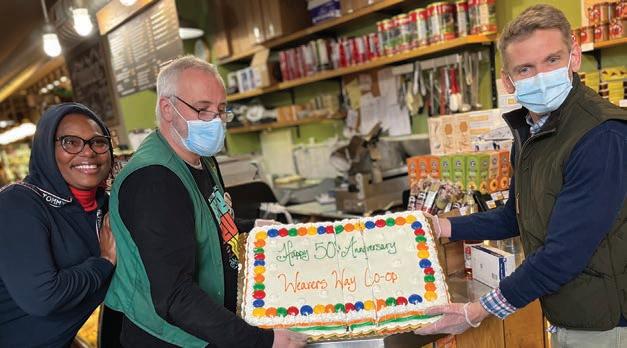
Ned was a longtime Co-op member, a former member of the Co-op's Board of Directors and the Co-op's financial consultant for many years. He was actively involved in the complex financing related to our Chestnut Hill and Ambler expansions. We are a stronger organization because of him.
● 133 members rolled over an existing loan
● Participation of members spanned the zip codes in which our stores are located, but neighbors close to Germantown really showed up, including those from East Falls, Roxborough and Manayunk

● Ambler area members and Germantown members had near-equal participation (51 new loans from the Ambler area, 46 from the Germantown area).
T● The median new loan amount was $2,500 The loans will be put to good use right away. While a great deal of design work took place in 2022, the real progress will begin this year. Applications for construction permits have been submitted, and we are awaiting approval
OVER $1.3 millon RAISED see page 22
Weavers Way Cooperative Association 559 Carpenter Lane, Philadelphia, PA 19119 www.weaversway.coop CHANGE SERVICE REQUESTED JANUARY-FEBRUARY 2023 Since 1973 | The Newspaper of Weavers Way Co-op Vol. 51 | No. 1 The Shuttle Community-Owned, Open to Everyone (Continued on Page 6) (Continued on Page 19) (Continued on Page 19) Presorted Standard U.S. POSTAGE PAID Philadelphia, PA Permit No. 2658
here’s still time for you to jump in and run for a position on the Co-op’s Board of Directors. The process for becoming a candidate for this year’s election has recently been expanded to include additional opportunities and requirements for members to qualify. WE WANT YOU! WE WANT YOU! 2023 Weavers Way Board of Directors RUN FOR THE BOARD
for a
Board
Possible
Run by
Baum and Sylvia Gentry, Weavers Way Leadership Committee
the
50th Anniversary Kicks Off with Cake! photo by Virginia Souder From left, Accounts Payable Specialist Candy Bermea-Hasan, Mt. Airy Store Manager Rick Spalek and General Manager Jon Roesser show off the anniversary cake. photo by Virginia Souder 50th Anniversary Planning Committee members and Co-op members Karen Schoenewaldt,
middle, and Linda Schatz, right, handle the cutting and plating duties.
photo
OVER $1.3 millon RAISED 3 DAYS ONLY February 10-12 SUPER SNACK MENU Fly Eagles Fly!
Editor’s Note

 by Karen Plourde, Editor, Weavers Way Shuttle
by Karen Plourde, Editor, Weavers Way Shuttle
What do you know — Weavers Words lives!
After my dire pronouncement about the future of our poetry corner last month, readers responded with a selection of original works and reflections on favorite poems written by others. As you’ll see on page 21, we were able to fit an original poem (the first about the Co-op’s 50th anniversary) and a reflection in this month’s edition. Depending on the length of what we get, we’ll either alternate poems and reflections or run both.
Thanks for showing up and submitting. And if you feel inspired by what you read, please consult our revised guidelines.
While Weavers Words keeps rolling along, we also have a few new features that you’ll find in future issues. On page 11, Sally Mccabe’s article on winter seed sowing (minimal materials, no grow lights needed) is the first in a series that will be written by staff members of the Pennsylvania Horticultural Society. Be on the lookout for articles on community gardening, urban agriculture and more. Sooner or later, we’ll have to work on a name for the column. In the meantime, enjoy the content, all you get-your-handsin-the-dirt types!
On page 11, Esther Wyss-Flamm, president of the Co-op’s Board of Directors, kicks off a monthly column on different aspects of Board life. A different board member will write on a topic of their choosing in each Shuttle. Whether you’re considering becoming a candidate at some point or just want to learn more about What Those People Do, I think the columns will be illuminating for everyone.
On that same page, you’ll find “Did You Know?” a new feature put together by the Historic Preservation Initiative of West Mt. Airy Neighbors. The group aims to highlight historic structures in Mt. Airy with the idea of preserving as many of them as possible. At a time when development throughout the city has been in overdrive, it’s good that there are folks working to slow the pace.
You’re up to date! Catch you in the pages next month.
The Shuttle is published by Weavers Way Cooperative Association.
Statement of Policy
The purpose of the Shuttle is to provide information about co-ops, healthful food and other matters of interest to Weavers Way members as consumers and citizens. Weavers Way members are welcome to submit articles (about 500 words) and letters to the editor (200 words) on subjects of interest to the Co-op community. No anonymous material will be published; all submissions must include an email or phone number for verification. The Shuttle retains the right to edit or refuse any article or letter. Submit to editor@weaversway.coop. Articles and letters express the views of the writers and not those of the Shuttle, the Co-op or its Board, unless identified as such.
Advertising
Advertising for each issue is due the 1st of the preceding month, e.g., Dec. 1 for January. Ad rates are online at www. weaversway.coop/shuttle, or call 215843-2350, ext. 314, or email advertising@ weaversway.coop. Advertised products or services may not be construed as endorsed by Weavers Way Co-op.
Check It Out!
by Karen Plourde, Editor, Weavers Way Shuttle
Urban Essence Soaps Focus on Luxury Ingredients

Philadelphians Timothy and Theresa Peoples-Minor started Urban Essence so they could make and sell affordable skin care products that contained a higher percentage of luxury ingredients like shea butter and hyaluronic acid. They found that commercially produced soap was making their skin feel dry, itchy and dull, and had several nieces and nephews with eczema whose condition was made worse by using conventional soaps. These Black-owned vendors of bath, body and hair products will celebrate their 20th anniversary in 2023.
From Feb. 1 through Feb. 28, you can take $1 off 4.4-ounce bars of their luxury bath soaps, available at all Weavers Way wellness locations (reg. $5.99 each).
Hidden Hills Dairy Cheeses Offer Bedford County Goodness

The Jersey cows that are the source of Hidden Hills Dairy cheeses spend their days from April through October grazing near the rolling hills of south central Pennsylvania. The Knepp family produces lovely raw milk fromages like the semisoft, creamy Buttercup and the sharper, aged Gouda-like Old Gold in a licensed facility on the farm.
For the month of February, Hidden Hills’ Old Gold is on sale for $21.59 a pound (regularly $26.99). Buttercup, meanwhile, will be $4 off a pound (reg. $19.99).
OT Granola Makers Produce
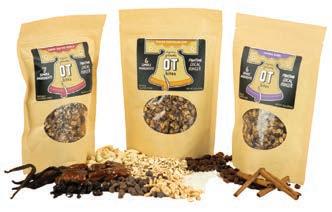
A Healthier Granola That Combats Hunger
Brothers John and Peter Marshall, the team behind West Philly-made OT Granola, got into the food business in part because of the food insecurity John witnessed among his students when he was a teacher in New Orleans. During that time, he snacked on a lot of granola to keep up his energy level and found his choices were either not healthy or lacked taste.
They came up with a line of granolas that contain seven
ingredients or less and come in three flavors: peanut butter chocolate chip, cherry almond vanilla and oatmeal raisin. As part of their commitment to combating food insecurity, the Marshalls donate 10% of their profits, along with product and their time, to Philabundance. In February, six-ounce packages of OT Granola will be $2 off (regularly $7.99 each).
Merzbacher’s Marvelous Muffins
Are a Northwest Philly Treasure
If you haven’t tried Merzbacher of Germantown’s Phillystyle English muffins…get busy! They’ve been on Co-op shelves for close to 10 years now and have since been joined by other signature creations like their sweet potato buns, focaccia and malty grain and French toast breads. Those muffins, though: squarish and hefty, they’re made from fresh milled cornmeal and toast up beautifully. Four packs of all four flavors will be $3.99 each (regularly $5.49) for all of February. That price, by the way, is for Co-op members only.

Let Vermont Salumi Sausages

Grace Your Grill or Frying Pan
As I write this, we are 19 days away from the Super Bowl and the Philadelphia Eagles are playing in the NFC Championship game. Regardless of what happens in the next couple weeks, the omnivores among us should check out the preservative, sugar, and filler-free selections from Vermont Salumi of Barre, VT. Their five 14-ounce varieties will be $6.49 each all next month (regularly $7.99). Go Birds!
The Way of Shea (Bae)
by Kieran McCourt, Weavers Way Ambler
Shea butter can be magical for anyone with dry skin, whether it’s due to winter-suppressed humidity or forced hot air heat.

It’s fat extracted from the seed of the shea tree, which is indigenous to much of the savannah of central Africa. In the regions where these trees are indigenous, shea butter is used as a cooking oil and in many other applications. In the United States and Europe, it’s used for its moisturizing and emollient properties.
Raw and unrefined shea is often ivory to grayish yellow. It is solid at room temperature and can have a nutty aroma. It will begin to melt from body heat and can be an unaltered moisturizer. A little goes a long way.
Shea can become even more luxurious when whipped with other oils into a smooth, creamy lotion. I like to combine two parts shea butter to one part each coconut oil and a liquid fat (jojoba, sweet almond, apricot or even olive oil). For example, one cup shea + ½ cup coconut oil + ½ cup sweet almond oil. You can scale down or up as needed.
Heat the shea butter and coconut oil over a double boiler in a heatproof bowl. Allow both to melt before removing from the heat and adding your liquid oil. Cover and chill
the blend in the fridge. This will let the mixture start to firm up and begin to return to a more solid state.
Caution: Whipping the mixture by hand will be difficult; opt for a hand mixer or a stand mixer instead. This forces air into the mixture, turning it into a light, fluffy cream.
Transfer the shea butter blend into wide-mouth jars with well-fitting lids. When stored in a cool, dark place, whipped shea butter can last for a few months. But I’ve not yet gotten to a point where it wasn’t used up before it could potentially go off.
Essential oils can be used to scent the whipped shea butter to personal taste. Make extra for a luxurious Valentine’s Day treat, or file it away as a DIY holiday gift idea.
Note: While shea butter is derived from a tree nut, there are no known or documented allergic reactions to it. Use your own discretion or consult a medical professional if this is a concern.
2 THE SHUTTLE January-February 2023
An Easy-to-Makes Indian Entree for Weeknights
The inspiration for moji masala Came out of JD and Shireen’s efforts to prepare home-cooked Kashmiri food for themselves and their daughter after a busy workday. They produce a selection of premeasured homemade spice packets (masalas) based on the ones Shireen’s mother (“moji”) made for them as a dinner prep timesaver. They believe their spice blends can make homemade Indian cooking more approachable to everyone.
MOJI MASALA CHICKEN RASEDAR
Ingredients:
• ¼ cup high-heat neutral oil (like canola or sunflower)

• 1 medium yellow onion, chopped fine (about 1 ½ cups)

• 1 medium ripe tomato, diced or 1/₃ cup highquality Italian tomato puree
• 1 ¼ tsp. fine salt (not sea salt)
• 1 packet Moji Masala chicken rasedar masala 2 lbs. bone-in chicken thighs or legs (approx. five thighs), skins removed

½ tsp. Moji’s garam masala (optional for deeper flavor)
• ½ tsp. high-quality dried or one handful fresh mint, chopped fine (for garnish)
• 1 ½ cups Thai jasmine or Indian basmati rice (prepare as instructed)

Directions:
Place a Dutch oven or other large, heavy pot on mediumhigh heat. When the pot is hot, add the oil. Add the onion to the hot oil and sauté until mostly dark brown, approximately 6-8 minutes. Add a splash of water, cover immediately and take off heat. Let sit for 30 seconds.
Add the tomato and stir continuously for about four minutes until it releases all its water, softens and breaks apart. You should have a nice paste at this point. Add water as necessary to prevent the paste from drying out.
Add salt and the chicken rasedar masala packet. Add a little water (about 1/8 cup) and stir until well incorporated. Saute for 2-3 minutes until paste slightly thickens again.
Add the chicken and cook each side for about 3-4 minutes, adding water as necessary to prevent your masala base from burning. Your base should remain slightly moist
but not watery. Move the chicken around from time to time so it doesn’t stick to the bottom.
Add about 1 ¼ cups of water (enough to cover half the chicken) and scrape the bottom of the pot to remove the stuck bits of onion and tomato. Bring to a boil. Turn heat to low, cover and cook for about 25-30 minutes until the chicken is fully cooked and tender. About halfway through, turn chicken. Check occasionally to make sure the chicken is not sticking to the bottom.
Turn heat back to medium-high. Reduce liquid for a couple of minutes until it thickens. Stir frequently so chicken does not stick to pan. Adjust salt if needed. Turn off heat and stir in the garam masala and mint. You can adjust the flavor profile by sprinkling in a bit more garam masala — there will be a moment where all the flavors balance just right.
Serve with rice and plain yogurt to cool the palate.


February 8-14
ABOUT THE CO-OP
The Days of Waiting Lists and a Long-Term Customer Cap
Would you believe there was a time when Weavers Way had a waiting list for members to join?
In 1973, the Co-op reported that it had 500 member households but couldn't take on more members due to space restrictions.
From mid-1975 to early 1979, prospective members were put on a waiting list because our flagship Mt. Airy location couldn't handle more shoppers. We all remember the store caps and lines that were put in place during the early part of COVID, especially in our Northwest Philly locations. In 1973, the Mt. Airy store could only accommodate five shoppers at a time! Other members had to park themselves in the waiting area at 557 Carpenter Lane until a shopper checked out.
Today, Weavers Way is over 11,000 households strong and growing! We’re working on opening our fourth store and are gearing up to launch a grand membership campaign in Germantown to get people excited about our newest store.
—Nima Koliwad, Weavers Way Community Programs Coordinator
As part of our celebration of Weavers Way's 50th anniversary, we'll include a lesser-known tidbit about the Co-op's history in every issue of the Shuttle this year. If you know, you know — if not, that's ok, too!
January-February 2023 THE SHUTTLE 3
Recipe by JD Walsh and Shireen Qadri, owners of Moji Masala spice blends (available at Weavers Way Ambler)
Love to Love You, Baby! Our Valentine's Week Specials NY Strip Steaks $14.99 ea reg. $19.99/ea Lobster Tails $7.50 ea reg $11.25/ea ...and don't forget the flowers! Roses, Tulips, Mixed Bouquets and More... Exciting chocolate/sweets sales featured in Co-op Deals! Whisked Cookies 2/$12 reg. $7.99/ea Assorted Including: Nickerdoodle, Chocolate Chip, Blackout, Salty Oatmeal, Cherry Chip
CELEBRATING 10 YEARS!
608 Carpenter Lane 215-843-8289 foodmoxie.org
608 Carpenter Lane 215-843-8289 foodmoxie.org
Executive Director
Executive Director
How Food Moxie Came to Be
by Glenn Bergman, Member, Food Moxie Board of Directors
For those of you who are new to weavers way or have been here since pre-industrial times (like the Co-op’s Purchasing Manager, Norman Weiss), I’d like to share some history about Food Moxie’s birth. In 2023, we’ll mark our 16th year of operations.
KIMBERLY FLEISHER kim@foodmoxie.org
JILL FINK jill@foodmoxie.org
Development Director
ALLISON BUDSCHALOW allison@foodmoxie.org
PROGRAM DIRECTOR
Food Moxie, a/k/a Weavers Way Community Programs, was formed to assist with the nonprofit work to meet the goals of Co-op members, which included teaching children and adults about healthy food, understanding where food comes from, and learning how to garden.


Program Director
ANDREA DOWNIE andrea@foodmoxie.org
DORENE REGIANNI dorene@foodmoxie.org
Office Manager
LEAD GROWERS/EDUCATORS
JULIA LEMYRE info@foodmoxie.org

ELAINE S. HOLTON elaine@foodmoxie.org
Youth Education Coordinator
MELISSA POWELL melissa@foodmoxie.org
AINHOA WOODLEY ainhoa@foodmoxie.org
Farm & Garden Manager
BRANDON RITTER brandon@foodmoxie.org
ANTOINE FOWLER antoine@foodmoxie.org
When I started as general manager of the Co-op in April 2004, I soon learned that staff members Margie Felton and Stephanie Johnson had been donating a few hours a week to run a program called Market Place with the students across the street at C.W. Henry School. I also learned that there was a volunteer gardening/farming program that was started by Norma Brooks and a few volunteers at Awbury Arboretum. Every spring they had a propagation party at Summit Presbyterian Church to plant seeds in trays with children. The children and parents would take the trays home and propagate the seeds.
Once the seedlings were ready for planting, the Weavers Way Farm Club would meet the kids and parents at Awbury to plant the seedlings. Back then, all of what is now the Awbury Agricultural Village was overgrown except for the community garden on Ardleigh Street and a small piece of land where Ken Kolodziej ran a tree farm and was working with returning citizens. Norma and her volunteers brought classes from local schools to tend to their plants and bring home their bounty.
(Continued on Next Page)
4 THE SHUTTLE January-February 2023
We dig what we eat.
THANKS TO... For Their Support! Drop $2 (or more!) at any register to benefit Food Moxie programs Giving TWOsday
Students at A.B. Day School in East Germantown pour smoothies and operate the cash box as part of WWCP's Marketplace program in 2014.
(Continued from previous page)

I realized that we needed to fund this work and decided to start a nonprofit that could accept foundation funding, individual giving and even government grants.

I learned that the Co-op had started a nonprofit called Education for Alternative Economics overseen by Alan Dawley, a member and professor of history at the College of New Jersey. Unfortunately, the charter for EAE focused on teaching and educating the community about alternative economic models rather than nutrition and urban farming. Though we tried to fit the Market Place and the urban gardening program into the EAE charter, it was like fitting a square peg into a round hole.
Co-op members Adina Abramowitz, Barbara Bloom, Bonnie Hay, Bob Noble, David Pearson, Liz Werthan, Ed Rogers and Larry Schofer were the initial board members of WWCP. They helped me with funding contacts and placed WWCP under the umbrella of a fiscal agent, Northwest Community Services Organization. Susan Beetle, the Co-op’s longtime finance director, was the Mt. Airy Community Services Corporation’s finance staff member and guided us with financial matters.
Our first grant came from a national cooperative group in Washington, DC. We requested $15,000 and received $7,500 to start our work by paying staff to work the programs. Liz introduced me to a few members who helped with underwriting the executive director position and providing some operating funds for the programs.

Sixteen years and four executive directors later, I am happy to still be engaged with Food Moxie. Kim Fleisher, the current E.D., brings new blood, direction and perspectives to Food Moxie, which is important as we enter new times. Our current and incoming board members energize me as we plan to take on new projects this year. The board and staff are more diverse and open to change than ever before.
Many thanks to the staff and owners of the Coop for your years of support as donors, volunteers and board members of our nonprofit sister. How quickly the years are going by!
January-February 2023 THE SHUTTLE 5 We dig what we eat. Interested in learning more or applying? Contact co-chair Catherine Kendig at Catherine@foodmoxie.org Help support gardening, farming and culinary arts education in NW Philadelphia! Food Moxie is looking for new board members.
A School District teacher with her Marketplace crew in 2014.
A Few Points About the Plastics Problem
IappreCiate sandra folzer’s Clear-eyed shuttle artiCle about plastiCs (“Is It Time to End Single-Stream Recycling?” Dec. 2022) as well as Norman Weiss’ thoughts about plastics greenwashing in his December “Suggestions” column. It seems like we have been encouraged to be ostriches with our heads in the sand even as products that recently have been sold in biodegradable containers increasingly are only available in plastic.
Three fast points:
1. Some fungi can dissolve plastics by being in proximity to them. Can we spend time, effort and money working on natural solutions to unnatural problems?
2. I strongly agree with the point that water is too precious to use to clean plastics that are often not recycled anyway, depending on where we live.
3. In Europe, they have recently instituted laws in which the manufacturer of whatever is being sold in plastic must take back the empty containers. If you let that sink in, you can imagine a lot of good solutions coming from it. Many thanks and best wishes for a greener new year.
—Kate Poursharati
Stop Buying From Bell & Evans
I’m writing to ask that weavers way Consider ending the purChase of Bell & Evans chicken. The company will be fined for polluting the Susquehanna River watershed, per a Feb. 26, 2021 article published in the Philadelphia Inquirer (“Poultry Plant Owned by Bell & Evans Will Be Fined for Polluting Susquehanna River Watershed.”)
The About Us page of the Co-op’s website states:
“As a cooperative, we ground our efforts in the seven International Co-op Principles. As a not-for-profit, our organization can put people and planet before profit.” Thank you.
—Nina Epstein
More Ways to Ready Yourself For a Board Run
(Continued from Page 1)
SHUTTLE LETTERS POLICY
The Shuttle welcomes letters of interest to the Weavers Way community. Send to editor@ weaversway.coop. The deadline is the 10th of the month prior to publication. Include a name and email address or phone number for verification; no anonymous letters will be published. Letters should be 200 words or less and may be edited. The Shuttle reserves the right to decline to publish any letter.
O•P•I•N•I•O•N
A Ukrainian Relief Organization That Deserves Widespread Support
by Glenn Bergman, for the Shuttle
Every morning when i wake up and realize that I am still breathing, I turn over and grab my phone and reading glasses (it has come to that), to read the weather report. I then go right to the Philadelphia Inquirer or New York Times to see the latest news from the battlefields of Ukraine and Congress. I read for a while, especially the reports from Ukraine. Then, like many of you, I wonder what I can do to help the Ukrainian initiative.
I also think back on how I got to be here, how my father had to flee Hungary in 1938 or be killed on the streets or in a concentration camp. I wish we had the support to fight the Nazi machine in the 1930s, but for many reasons, that didn’t happen.
In the Dec. 18 edition of the Inquirer, there was an excellent article by Trudy Rubin on three different nonprofits that she trusts and has seen in operation in Ukraine. I decided if Trudy supported these groups, then I would donate to each of these organizations in honor of each of my children. Then I wrote to the one that I thought I could help with additional fundraising support: Ukraine Trust Chain (www.uktrainetrustchain.org).
UTC, a network of small volunteer groups, raises funds to buy and handle logistics for food, medicine, warming
shelters, generators and anything that is needed by their groups in Ukraine. They provide the products that they are told are needed and then deliver them to the designated areas.
I also decided to support this group because one its co-directors lives in West Philadelphia, is a member of Mariposa Food Co-op, and grew up in Kyiv. He told me he and the founder, Daniil Cherkasskiy, who lives in Chicago, shared a desk in elementary school. You can find Cherkasskiy’s bio on the website, along with bios of the group leaders in Ukraine and the operations team in the United States.
If you are interested in sponsoring an in-house fundraiser at your home or place of work for UTC, please let me know.
I am happy to work with you and bring Trust Chain material and speakers to your house or other locations (church, synagogue, community meeting space, etc.).
You can view a PBS Newshour piece about this nonprofit at www.prs.org/ newshour. Search for “Volunteers Risk Their Lives to Provide Aid to Ukrainians Trapped on the Front Lines.” You can reach me at 267-515-1234 or gbergman21@gmail.com.
Glenn Bergman is a former general manager of Weavers Way Co-op and a member of Food Moxie’s Board of Directors.
Here are the changes:
1. Potential candidates now have another chance to attend a required winter Board of Directors meeting: Feb. 7 or March 7. For meeting information, please contact Margaret at boardadmin@weaversway.coop.
2. A date has been added to the required virtual Run for the Board information sessions. In addition to Saturday, Jan. 28 at 10 a.m., a final date in early February can be added if necessary. Please register with your preference for a date at leadershipcommittee@weaversway. coop.
3. The Leadership Committee is now requiring each candidate to submit a resume along with their formal application, written statement, photo and video interview (which will be arranged by the Leadership Committee in March). The submission date for the complete application is still Feb. 28. Who is eligible to run for the Board? Probably, YOU! Any member in good standing over the age of 18 is eligible. There are four positions on the 11-member board that need to be filled this year.
Ideally, the Board should represent each of the store neighborhoods that make up our constituencies: Germantown, Mt. Airy, Chestnut Hill, Ambler

and Roxborough for our farm market. The Board would benefit from directors with a broad range of ages, with an emphasis on younger members, who are so important to the Co-op’s future. Participants in the Food for All program, past or current, would add an important perspective to the Board’s decision-making.
While previous nonprofit board experience is preferred, it is not required. A range of professional, volunteer and personal life experiences and skills enriches the Board. For example, you may bring additional diversity — whether racial, ethnic, ability, economic, age, sexual orientation — to the group. Or perhaps you have, or know someone who has, professional expertise in diversity, equity and inclusion, which is an important focus for us.
The complete nomination packet will be available to potential candidates after they attend one of the information sessions. Some election process details can also be found on the Co-op’s website (weaversway.coop/board-elections). The newly required resume, which will not be shared publicly, will only be available to the Board to further understand the experience and expertise you will bring to the group, if elected. For more information, please contact leadershipcommittee@ weaversway.coop.
6 THE SHUTTLE January-February 2023
L•E•T•T•E•R•S
Our 50th Year Will Be Busy with Celebrations, a New Store and More
by Jon Roesser, Weavers Way General Manager
or those into in suCh things, here are some interesting anniversaries to commemorate in 2023: 250 years since the Boston Tea Party; 80 years since the Battle of Stalingrad; 60 years since the first Doctor Who episode aired, and 10 years since the death of Nelson Mandela.
Oh, and this: 50 years since the founding of Weavers Way Co-op.
Characteristically, this milestone crept up on us. But the redoubtable members of our 50th Anniversary Committee have been hard at work planning a whole year of events, specials and other fun stuff. So, also characteristically, we will celebrate our 50th by spending most of 2023 working really, really hard.

For starters, it will be a year of celebration. Those who were in our stores on Jan. 13 might have snagged a piece of anniversary cake, but that was just a prelude. The General Membership Meetings in May and October will be bigger events than usual, and other events, both in-store and out, are being planned.
On the last weekend of each month, we will run anniversary specials in which items will be marked down to their 1973 price, along with other specials throughout the year. We’ll also debut a whole line of 50th anniversary products, including a new specialty sandwich.
We will sponsor special fundraisers for bolstering the Co-op’s efforts to combat food insecurity, including the community fridges we support. We’ll also share recipes for some of our signature prep foods items and will put together a time capsule to be opened when we celebrate our 75th.
Our goal is to ensure that by December, everyone will be thoroughly sick and tired of hearing about Weavers Way turning 50.
2023 will be a year for growth. We are full speed ahead on our project to open our Germantown store. This is in no small part to our successful Member Loan Campaign, which raised $2.2 million, blowing past our
goal and reducing the amount of money we’ll need to borrow from banks.
Construction permits, applied for late last year, should be issued soon, and our contractor is expecting to be at work by April. It’s a six-month construction project, culminating in the installation of the equipment, which is now planned for the fall. Our goal of being open in time for the holiday season — meaning no later than early November — is aggressive but achievable.
2023 will also be a year of change, especially in our Ambler store. Now in its sixth year, our Ambler store, which was critical to our strategy for navigating us through the early part of the pandemic, is overdue for a reset, which is planned for spring and early summer. It will be a little disruptive, because we will shift around the center store, but the result will capitalize on one of the store’s principal assets — its size.
Much of this reset will be done with an eye toward affordability. In a period of high inflation, while recognizing that our emphasis on natural, organic and locally grown and produced food comes with a price premium, we can best meet our members’ needs by increasing the amount of good quality, lower-cost conventional products we sell, something we’ve always done but which our Ambler store’s size can more easily accommodate.
By the way, our plans for Ambler include resuming the Friday night community dinners later this year.
This will be a year to strategize. To better prepare for the future, we have embarked on a strategic planning process, which will conclude later this year. As part of the process, members can get involved in a variety of ways, including participating in online surveys, attending focus groups and completing in-store questionnaires.
Having a strategic plan will better prepare us for the years ahead, and allow us to capitalize on our strengths, improve our weaknesses, combat threats and take advantage of opportunities.
Finally, 2023 will be a year to preserve. The Co-op has changed a lot over the years, but much of what got us this far remains the same: a highly engaged member base, strong board governance, transparent and consistent communication and a commitment to community and the environment.
At our 50-year mark, the Co-op has now been around long enough to be viewed by many as an institution, an icon, older than most people in a city with a median age of 34. We are —and we can say this with pride — part of the cultural tapestry of Philadelphia.
It is my honor and my joy to serve as the general manager of this incredible organization, especially during this milestone year. Now, let’s get back to work!
See you around the Co-op.
January-February 2023 THE SHUTTLE 7 GM’S CORNER GM’S CORNER
F“ “ We will celebrate our 50th by spending most of 2023 working really, really hard. EASYPAY EasyPay house accounts are an EASY way to PAY at Weavers Way! www.weaversway.coop/easypay Do you enjoy being a human being? www.premrawat.com We’re looking for mid-century furniture and decorative items WILL BUY OR CONSIGN Contact bethany@weaversway.coop Feel free to send images of your items NO DROP-OFFS PLEASE! WEAVERS WAY A General Store of Local & Unique Finds Saturday & Sunday 10am - 5pm 542 Carpenter Lane www.weaversway.coop/mercantile @weaverswaymerc
Some Less-Than Satisfying Responses to Story on Heavy Metals in Chocolate
by Karen Plourde, Editor, Weavers Way Shuttle
After news broke last month of a Consumer Reports article that found high levels of lead and cadmium present in assorted varieties of dark chocolate — including many brands carried by Weavers Way — shoppers had a whole lot of questions for staff. Purchasing Manager Norman Weiss reached out to a few vendors, including Tony’s Chocolonely, Equal Exchange and Chocolove, to get their responses about the findings, which were also part of news stories on National Public Radio and CBS News.
Their replies, although sincere, were vague.

Consumer Reports tested 28 dark chocolate bars for lead and cadmium, using California’s Maximum Allowable Dose Levels for lead (0.5 micrograms) and cadmium (4.1 mcgs). The percentages of the bars are for an ounce of dark chocolate.
In their email, Equal Exchange stated that they take the quality and safety of their products seriously and had done a lot to understand the issue. “We continue to be confident that our chocolate products are safe,” they wrote.
EE added that cadmium and lead are found in chocolate at trace levels, most often due to uptake from soil on cacao farms through natural processes. Trace heavy metals naturally occur in many items that grow in soil, including grains, potatoes, rice, leafy greens, tomatoes and more. They continually work with their manufacturing partners and test their products to make sure they’re safe.

According to EE’s data, their chocolate bars test below the cadmium and lead standards set by a 2019 settlement in California, and below the cadmium limits set by the European Union for chocolate. They pointed out that cadmium is more prevalent in the soil in Latin America,
where they source most of their cacao beans, mainly due to the volcanic nature of the soil.
According to the Consumer Reports article, EE’s Organic Extra Dark chocolate bar (80% cacao), had a lead level of 45% and a cadmium level of 120%.
Chocolove stated that they have been testing for lead and trace minerals in their products since 2016. Their Belgian chocolate supplier tests their cacao beans before purchase and tests all their chocolate and the added ingredients in the bars (such as dried fruit and nuts) after they’re made. In some cases, they have changed suppliers whose ingredients didn’t meet FDA and Prop 65 (CA) safety guidelines.
The company went on to say that they believe their 88% and 77% cacao bars fall within all published FDA and state safety guidelines. According to the Consum-
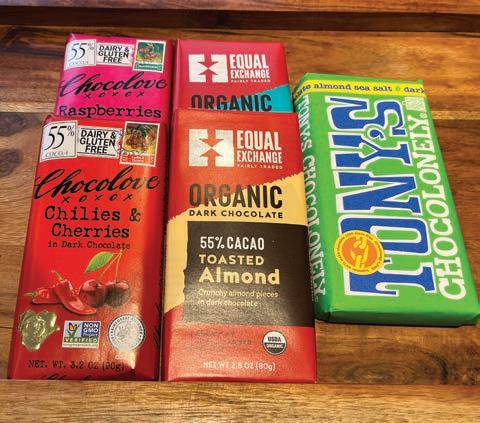
er Reports story, Chocolove’s Extreme Dark Chocolate (88% cocoa) had a lead level of 240% and a cadmium level of 83%. Their Chocolove Strong Dark Chocolate (70% cocoa), meanwhile, had a lead level of 152% and a cadmium level of 60%.
The response from Tony’s struck a chord similar to the other two manufacturers. They wrote that they take health and safety seriously, and that their bars fall well within the range for heavy metals set by the European Food Safety Authority and the FDA. They added that the guidelines put forth by the California Office of Environmental Health Hazard Assessment, which formed the basis for the Consumer Reports article, are not food safety standards.
Like the other two chocolate makers, Tony’s states that they analyze their products to make sure the levels of heavy metals are as low as possible. Their current threshold is .15 parts per million, which is in line with European and U.S. food authority standards. When they analyze their finished products, they use a threshold of .10 parts per million, which they say is well below legal health and safety limits. The analysis is done by an external accredited lab. According to the Consumer Reports story, Tony’s Chocolonely Dark Chocolate (70% cocoa) had a lead level of 134% and a cadmium level of 28%.
After going over the responses, the decision was made to pull the bars that rated highest in heavy metal content, according to the Consumer Reports article. For the details on the Co-op’s response, see Norman’s Suggestions column on p. 18.
8 THE SHUTTLE January-February 2023 ! 215-588-6586 or visit us at Leave your billing headaches behind. We exclusively support behavioral health professionals. Sparking Creativity penncharter.com/visit
Imagining a World Without Waste
Jar Libraries Are Back, the Latest CRP News and “Lunchskins”
Reduction Task Force
Community-Powered Jar Library Returns
You’re at the Co-op, and you realize you need a cup of flour. You know that flour is sold in the bulk section, but you don’t have any containers with you. What do you do? Now that the Jar Library is back, you’re covered!
The Jar Library, a celebration of circularity, was born in 2019 to reduce single-use plastic waste and encourage more plastic-free shopping at the Co-op. It’s a self-serve collection of free, clean, pre-tared glass jars that shoppers can use and fill while shopping in the bulk section. The motto is “take a jar, leave a jar” — you take jars when you need them, and you bring the same or different jars back when you can.
Shopping in the bulk section is an incredible way to save money (you only buy as much as you need) and avoid the excessive single-use plastic that comes with many pre-packaged items. But using the plastic sleeves available in the bulk section just perpetuates the plastic problem. Thus, the Jar Library is here to save the day.
The start of the COVID-19 pandemic in early 2020 put an indefinite pause on Jar Library operations. We were disinfecting our cereal boxes and apples, so who could imagine touching a jar from someone else’s house? Almost three years later, we’re excited to bring it back, this time with improved cleaning procedures.
How it Works:
1. There are two crates in each store — one for the ready-to-use Jar Library and one for the Jar Return. The ready-to-use jars have been sanitized.


2. Take a jar from the Jar Library if you need one while shopping.
3. Fill it with whatever you’re buying and be sure to put on a piece of masking tape with the PLU number of the item you’re purchasing. (All jars will be pre-tared, meaning the weight of the jar will be already written on it.)
4. When you’re done with the jar, thoroughly clean and dry it, and put it in the Jar Return bin.
Important notes about donating jars: If you’re returning or bringing new jars to the Jar Return, please note the following:
● Jars must be made of glass (no plastic of any kind)
● Jars must be thoroughly washed and contain NO food residue
● All labels and label adhesives must be removed
● Jars must be completely dry
● Each store can only accept jars that fit into the Jar Return crate. Any jars that don’t fit must be taken back by the shopper.
Note: The Jar Library is entirely separate from the Container Refund Program. Jars in the Jar Library are free for customers to take, and customers do not receive any refund if or when they return the jars.
Where to Find the Jar Libraries
Each store’s Jar Library is in the bulk section. In Mt. Airy, it’s located on the lowest metal shelf across from the coffee bins. In Ambler, you can find it near the scale by the first row of bulk bins. In Chestnut Hill, it’s located underneath the scale on the bottom shelf next to the trash bin (the Jar Return is located behind register four by the back door).
Also, be sure to do your bulk shopping on the first weekend of every month during Weigh It Weekend. You’ll save 10% off your bulk purchases if you bring your own containers (or use the Jar Library)!
The Jar Library is spearheaded by the Plastic Reduction Task Force, which is part of Weavers Way’s Environment Committee.
The Latest on the Container Refund Program
There have many exciting developments recently in Weavers Way’s Container Refund program, along with some challenges. Our current numbers indicate that 11,030 reusables have been purchased since the launch on Earth Day 2021. When ECHO Systems picks up the collection of dirty containers to be sanitized every week, we are impressed by the numbers.
Each container returned signifies an important action. This program allows a package to be reused hundreds of times, keeps the consumer from generating waste and liberates the producer from purchasing endless amounts of plastic to pack goods that will inevitably become waste in the community. In our little Co-op bubble, we have been doing an incredible job with this, and the hundreds of containers that we process weekly are a key performance indicator.
Here’s some community feedback to keep this program growing and improving:
● Please always return CRP items rinsed, dried and free of food residue.
● The lids must be included in your deposit return
● Do not write on or place stickers on CRP items
● Try to return items in a timely fashion. Doing so prevents the Co-op from running out of stock and needing to purchase more (which defeats the purpose of the program).
In other news, we have been doing some testing to make our labeling process much more streamlined and elegant. We have identified a new water-soluble label and are in the process of making the label waste free.
We recently tested a CRP salad kit in Ambler. It includes a medium-sized container that carries a $3 deposit and a small salad dressing jar that has a $1 deposit. It will be launched for grilled chicken Caesar salads in Ambler first. We know you’ll love it! Please be sure to return both containers to help keep them circulating.

This is a big cultural shift for our community, and we hope to continue to grow our reuse program over
the years so that it becomes synonymous with the Coop’s culture. We believe that our local vision for reuse can demonstrate the ecological stewardship and preservation that is possible when we move collectively with intention and thoughtfulness
Thank you to everyone who continues to support the CRP program and thanks to the Weavers Way staff and leadership who make it possible.
— Alisa Shargorodsky, ECHO System
Plastic Reduction Product of the Month
Type: Yard-Compostable Sandwich Bags

Brand: Lunchskins
Stores that stock it: Ambler, Mt. Airy
Are you starting the new year with goals to eat on the go less, pack your lunch more and/or snack on healthier alternatives? If so, you may want to resolve to use less plastic at the same time by incorporating paper sandwich bags into your routine.

These bags are made of unbleached FSC-certified Kraft paper, unlike their plastic counterparts, which are made of polyethylene from non-renewable resources (e.g. crude oil, natural gas, coal tar). They’re biodegradable, backyard compostable and recyclable, and decompose optimally in a matter of weeks, as opposed to plastic film, which lasts hundreds of years.
Swapping single-use paper sandwich bags for plastic requires a minor behavior change. But with a little extra effort, you can achieve two goals instead of one. Each time you fill the paper bag with a wholesome sandwich, nutritious snack or homemade goody, you’ll be on the road to a better you and will take a step forward in achieving a plastic reduction lifestyle.
Next time: Reusable food wraps
—Sue Landers
The Plastic Reduction Task Force is a group of volunteer members and staff committed to investigating waste issues associated with the full life cycle of plastics, raising awareness about the effects of unregulated plastic production and advising the Co-op on ways to reduce single-use plastics in our operations. Please contact us at prtf@weaversway.coop.
January-February 2023 THE SHUTTLE 9
Plastic
photos by Karen Melton
Ambler, Chestnut Hill and Mt. Airy jar library locations.
Winter Seed Sowing Gives Gardeners a Jump on Planting Outdoors
by Sally Mccabe, for the Shuttle
Most hardCore gardeners get through the winter holiday season by playing with houseplants, but our hearts are still outdoors in the garden. So any growing activity that gets us outside is going to be embraced with open arms by the plant community.

While we’re all snug in our beds waiting for the days to get longer, seeds are already in the soil making life and death decisions about whether and when to sprout. They got there haphazardly when fruit rotted, seed pods exploded and even when birds dropped poop from the sky. They’re covered with leaves and are biding their time until conditions are just right for new plants to pop up out of the ground. Many get eaten, tromped, dried out, flooded, or blown away, or they come up in inappropriate places. As the extremes of winter give false warmth, freeze things solid, toss the ground, heave up soil and cover everything with snow, it’s total danger and chaos in the baby plant world.
Why Try Winter Sowing?
Winter sowing gives us a welcome piece of order in an otherwise tumultuous season. It allows us to add a degree of protection and control while taking advantage of a seed's natural tendencies. It’s cheap, it’s easy, and it gives us time to be outside with nature — just the opposite of starting seeds indoors under lights. Plus, most of us don’t have the situation, patience, equipment or the space to start half as many plants indoors as we would like.
How to Get Started
Developing a setup for winter sowing involves making a simple mini-greenhouse. It needs to be translucent, have drainage and venting and be deep enough for three inches of soil. It’s also helpful to have a few inches of headroom once the plants start sprouting. Examples of appropriate mini-greenhouses include a plastic milk jug or a two-liter soda bottle.
Next, remove the cap and poke or drill lots of holes in the bottom for drainage. Halfway up, cut the bottle or container three-quarters of the way around, creating a hinge. Fill with three inches of potting or seed starting mix that you’ve pre-moistened. Sprinkle seeds, then cover with a light layer of soil. Close the hinge and tape around with duct tape. Label and date the container with a permanent marker in at least two places;s then, place outside and repeat. That’s it. They’ll germinate when they’re ready, so there’s no fussing with timing and no need to harden them off before transplanting.
What Can You Grow?
You can start just about anything in winter except warm season annuals and vegetables. While you can also use this method to start those, you’ll have to wait until spring. Most gardeners start with perennials that have a cold requirement—that’s most of our native plants here
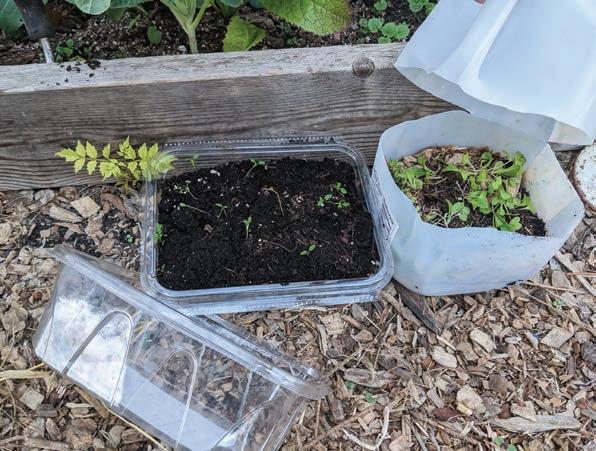
in Zone 7. I do vegetables that don’t have warm requirements, like mustards, kale, lettuce and spinach, and any herbs besides basil.
Winter sowing containers should be kept outside, where they can get some light. I sink mine into the ground a little so they’re less apt to blow away. They can be in full sun if they are vented, and some people put them right out in the garden beds. You can try out winter sowing right now, next week, even next month, or anytime from now through the end of the winter (around March 20).
Maintenance for a winter sowing setup is simple: water if dry, vent or drain if waterlogged. Watch for germination. Transplant individually or in chunks into their permanent homes when plants have two sets of true leaves.
Find Out More about Winter Sowing
The internet is full of resources about winter sowing. YouTube especially has informational classes, methodology videos and demonstrations to help you get started. A recent favorite video class of mine comes from the Indiana Extension Service. Additionally, there are Facebook groups for winter sowing where knowledge and tips are exchanged. Trudi Davidoff, the gardener who got us all started using this method, also keeps information on winter sowing on her site, upstategardenersjournal.com.
Winter sowing is a great way to continue outdoor gardening, even during cold, gray winter months, and it allows gardeners with limited indoor space or resources to get a jump on springtime plantings by starting seeds outdoors. Whether you’re a seasoned gardener or just starting out, give winter sowing a try this season using these tips. You’ll discover the many possibilities this method of gardening presents.
Sally Mccabe is associate director of community education and community gardens for the Pennsylvania Horticultural Society.
Apartment or roommate wanted:
Former Philadelphia university professor/journalist seeks apartment or condo with available parking in Montgomery Co., West Mt. Airy, Chestnut Hill, East Falls or Center City. Will consider a space to share with likeminded individual. No pets, smoking, or stairs.



Email: insights@lifeintrans.com

10 THE SHUTTLE January-February 2023 At the corner of Germantown & Butler Pikes Find out more at: pmfs1780.org /camp Summer is Coming!!! Seedlings Camp Ages 3-7 shop bulk save money & reduce waste
Are you having a plant-forward Veganuary? Don’t forget to visit Ambler for LUHV’s vegan offerings, available every day, 11am - 7pm. TRY THE VEGAN ITALIAN HOAGIE THAT IS ALL THE RAGE!
photo by Sally Mccabe
Salad greens containers and gallon jugs can be converted into vessels for outdoor seed sowing — just make sure to drill or poke the bottoms with plenty of holes. Containers should be able to hold three inches of soil.
The Nuances of Board Leadership, and the Power of the (Micro) Pause
Ever wonder what the work of Weavers Way Board of Directors looks and feels like? In each Shuttle this year, readers will meet a different member of the Co-op’s Board and get to know the behind-the-scenes leaders of this organization through their personal reflections. Note that the content does not in any way reflect the point of view of the entire board.
by Esther Wyss-Flamm, President, Weavers Way Board of Directors
Most of us have run over to the Co-op for “just a few things,” that we’ve scrawled on a shopping list. While walking the aisles, we might add a few more items to our basket, pay for the transaction, and run home to prepare whatever meal we had in mind. And then, maybe, we pause to enjoy the meal.
There’s a lot of running involved in and around the Co-op stores by customers, members and staff. Occasionally, I’ll see folks in the aisles deep in conversation (that seemed more prevalent pre-pandemic). But mostly, it’s about easy in and easy out.
That’s as it should be; we’re a society that values speed and efficiency. While many members appreciate the social aspects of belonging to a co-op, as consumers we value an easy shopping experience, and our stores have adapted to this reality.
However, we also need spaces where we can bring our deeper questions about where we’re going and how we’re addressing concerns about community, the environment and the business. A member-owned organization like the Co-op needs opportunities to look at the big picture. That’s where the board comes in.
As a lifelong student of organizations both professionally and academically, I’m a believer in the power of groups to bring about systemic change. Fifty years ago this year, Weavers Way was a small group of neighbors who banded together as a buying club with a commitment to access fresh, affordable food for their families. Half a century later, we are deep in it: over 11,000 households strong, a beloved neighborhood establishment active in three (soon to be four) locations, and an engaged membership that’s committed to seeing us thrive for the next 50 years (witness the $1.3 million secured through our recent member loan campaign).
Getting to this place is not accidental. We build on the work of many hands who have contributed to this amazing social experiment year after year.
Through Today and Into the Future
As board members, we are not about to rest on any laurels; we need to continue a legacy of strategic thinking by the generations that preceded us. We are taking a good look at where we are now and how we need to position ourselves moving forward as a triple bottom-line business (known as the Three P’s: people, planet, profit). Within the coming years, we’re poised to gross $40 million while being situated in an exceedingly competitive business environment.
Did You KNOW?
Architectural Style: Tudor Revival, early 20th century

This home is on the Philadelphia Historic Register of Historic Places due to its association with Sadie Tanner Mossell Alexander (1898-1989) and her husband, Raymond Pace Alexander (1897-1974). The Alexanders were political activists in education, law and civil rights, locally and nationally.
As an African-American woman, Sadie Alexander achieved numerous firsts. In 1921, she became the first African American to graduate from the University of Pennsylvania with a Ph.D. in economics. In 1924, she earned her law degree at Penn, the first African American to achieve that milestone. And in 1927,
The challenges ahead are enormous and sometimes daunting to consider. How do we maintain momentum? How do we support Co-op management as they seek to strengthen each store while expanding to a fourth location? How can we secure the continued success of the Co-op in the thick of economic forces beyond our control? And how do we update some of our cumbersome systems of oversight as we look into the future? The board knows the Co-op is in competent hands (shoutout to General Manager Jon Roesser and his team!), but the responsibilities can still weigh on us.
Given this history, I’ve had to ask myself what I’ve brought to the board table these past years. Which brings me to the power of the pause in leadership groups.
I can see my colleagues on the board shaking their heads and saying, “We do anything but pause; our work is endless.” Also, “we don’t want a board where everyone just sits around.”
I’m not talking about the pause of a hike in the Wissahickon, a morning meditation on a cushion, or even the pause of sitting in the car to catch my breath between work and getting home to the kids. These are all important, but I’m referring to the micro-pause that is barely visible. But if you pay attention, you can sense it’s there.
Pausing is an intentional mindset I bring to the board’s work. To the outside observer, our meetings might not look like anything beyond a group of people sitting together talking about stuff, but in my mind, none of what takes place is accidental.
There are many identities, histories, backgrounds, areas of expertise, perspectives, priorities, work rhythms, talking and learning styles in any boardroom, and finding ways to harness the best in such a group, is essential in moving forward with this work. Pausing means we allow these differences to show up, and respect and work with them as they emerge, even when they don’t fit cleanly into our agenda.
The Pauses That Refresh
At the beginning of each meeting, we enjoy a simple Co-op catered meal together, while appreciating everyone’s presence and commitment to showing up. A board member takes the lead with a quote or video clip to remind us of the values that guide us as we work to support the Co-op, particularly values rooted in the deep history of cooperatives in this country. I consider these interactions micro-pauses.
she was admitted to the Pennsylvania Bar, the first African-American woman to do so. Sadie and Raymond rank among the leading civil rights advocates in the history of Philadelphia.
West Mt. Airy Neighbors Historic Preservation Committee
Mt. Airy is a special place with a distinct character; it earned that image because it is a diverse community populated by civically engaged people. Nestled in northwest Philadelphia and adjacent to the Wissahickon Valley, Mt. Airy is blessed with natural beauty, and contains historic architecture spanning nearly 300 years.
The factors that make this place special, including the preservation of our historic resources, need to be nurtured through dedicated and active stewardship. The goal of the West Mount Airy Neighbors Historic Pres-
Board of Directors
During the business portion of our meetings, different board members speak up, provide updates, ask questions, offer suggestions, circle back to questions raised in prior meetings, and engage with issues brought to the table by the general manager. Here micro-pausing looks like not having anyone dominate the conversation. Members often take a breath (or get up for a stretch) before speaking up, and actively seek out different points of view.
Issues that are more sensitive or confidential in nature are given the chance to resurface and are brought into executive session (or even to our annual daylong retreat) for deeper review. Pausing in this context acknowledges the circularity of this work and helps us better prioritize, identify root issues, and maintain our focus on the best interests of the Co-op.
Pausing also resides in the quality of our self-paced work between meetings. Different board committees and working groups connect during this period. We know we have more fun and are more effective when we work together, draw on each other’s strengths, inspire each other, and build trust and a sense of safety among each other. In recent months, the board has transitioned (finally!) to an online platform, which is helping us interact more easily between meetings and come together in smaller working groups.
Finally, we need to periodically recognize it’s time for a party – a full-on pause to celebrate our work. This past year has featured a constant thread of conversation about the “Germantown project,” whose dimensions are vast and have implications for community engagement, finances and opportunities to do right by the environment. It’s been a heavy lift. So we lighten things up with opportunities to have fun, socialize and acknowledge our accomplishments.
You can check out how we work by coming to one of our monthly meetings. Maybe you’ll sense how in the thick of getting stuff done on the board, we’re attending to those all-important micro-pauses.
Constructed: 1915
ervation Committee is to identify and protect the character-defining features of the community by taking a proactive stance to recognize and protect the historic built environment for the future.
For more information contact wmanhpc@gmail.com.
January-February 2023 THE SHUTTLE 11
Sadie T.M. Alexander & Raymond Pace Alexander House 700 Westview St.
The Hows and Whys of Traveling Around Philly by Bus
by Betsy Teutsch, for the Shuttle
Mystified by our sprawling City bus system? Folks who didn’t grow up in Philly find the network of buses weaving through our neighborhoods opaque. Residents without cars depend on SEPTA, but those who drive most everywhere are often clueless about taking buses. Where are riders heading? When I asked this question on a listserv, answers flooded in.
Toby Kessler-Cohen watches for the Route 53 bus right out his window at Sedgwick Street and Wayne Avenue, where the route begins. As a child, bus drivers would let him get on and explore the bus, but now that he’s a Central High student, he hops aboard, gets off at Chelten Avenue, catches the 26 bus to Broad Street and Olney Avenue and walks to school.
Hadassah Weinmartin, also a Central student, returns to Mt. Airy via the 26 and the H buses. Her mother, Abby Weinberg, commuted to graduate school from Mt. Airy and took the 23 or the H to the Broad Street line south (that’s the subway, folks!) to Temple University.

Students heading to Germantown Friends or Greene Street Friends schools from Chestnut Hill, Mt. Airy or Germantown have a straight shot on the 23 bus.
Some Mt Airy residents take the H from various points to the heart of Mt. Airy to run errands, see plays, go to the gym, eat, hit the library, or switch to the 23 to get to Chestnut Hill. It’s a fun activity for little kids, and children under 12 are free on SEPTA when accompanied by an adult.
Alex Avelin and her daughter Zivia enjoy getting around the area by bus. “I have good and bad days on SEPTA, but I love it all the same,” Alex wrote.
Dr. Simone Zelitch uses the bus after taking long hikes; doing so allows her to walk further in one direc-
Jeju

South korea’s volCaniC jeju Island is home to the celebrated and highly skilled haenyeos women sea divers. For centuries, haenyeos have been diving into the perilous, unpredictable Korea Strait to harvest marine life. They use few pieces of gear in their work — a wetsuit, diving mask, fins, gloves, chest weights, an L-shaped weeding hoe and a net attached to a floatation device. They do not use oxygen tanks, and dive 80100 times during a five to six-hour workday.
There are three classifications of haenyeos: hagun, junggun and sanggun, based upon diving experience. Sanggun is the highest classification. While underwater, haenyeos contend with external challenges, including weather, sharks and jellyfish.

tion without retracing steps.
Noah Boyer works in the grocery department of Weavers Way Mt. Airy. He lives at Alden Park and takes the 53 bus to Wayne and Carpenter Lane, then walks to the Co-op. He heads home the same way and gets off at Rittenhouse Street.

Aaron Finestone, an active local lawyer in his 70s, ditched his car and now takes buses all over the Delaware Valley for free with his SEPTA Senior Fare card.
“Both the 53 and the H buses connect with the 65 bus, which goes to City Line Avenue and Upper Darby.,”
he wrote. “If I want to take the train to the Montgomery County Court House in Norristown, there is a connection on Route 65 to the Norristown train. If I want to get to Delaware County Court House in Media, I take the 65 bus to its end in Upper Darby and take the 101 trolley to the end of the line in Media.”
Using mass transit requires more planning and time than driving, but with the advent of cellphones, wait time can be productive. Plus, GPS now presents the routes and the expected arrival time of the next bus, decreasing the angst of seemingly endless waits. The time on the bus can be spent reading, observing our city, socializing with schoolmates, listening to podcasts or music, even napping — and not stressing out about traffic or parking.
Once a new rider has settled on a route and stop, then comes the next outsider question: How much is bus fare? Unlike Regional Rail, where roving conductors collect fares, bus riders pay when they get on. It’s $2.50 in exact change. SEPTA Key Cards are finally available for loading and swiping, but must be purchased at designated stations and some retail locations. They can be replenished online, and can be used for all SEPTA transit, which is a huge improvement.
SEPTA has proposed a major redo of the buses, eliminating some routes and running major, more direct routes with increased frequency. The next phase will be announced soon, there will be opportunities for feedback.
Next month I will write about our trains, trolleys and subways. My friend Helen Feinberg, a SEPTA connoisseur, observes that mapping out your route using all these systems is good brain exercise, along with getting in some virtuous steps and contracting your carbon footprint. Happy Trails!
Island’s Legendary Women Sea Divers
While submerged as much as 100 feet, haenyeos can hold their breath for one to three minutes. When they resurface, a unique, high frequency whistling sound (sumbisori) is released. It is created by rapidly exhaling carbon dioxide then deeply inhaling oxygen, which mimics the breathing of whales and seals.
UNESCO, the United Nations Educational, Scientific and Cultural Organization, includes haenyeos on one of its Intangible Cultural Heritage lists. The lists aim to ensure better protection of important intangible cultural heritages worldwide and to increase awareness of their significance.
—Rosa Lewis
Racial Diversity, Equity, and Inclusion
12 THE SHUTTLE January-February 2023
photo by David Teutsch Betsy poised for her next SEPTA bus adventure on Wayne Avenue in Germantown.
by Robert Simmon, using Landsat data provided by the United States Geological Survey. Jeju Island, South Korea
photo by karendotcom127/ Haenyeos female divers catch marine life for a living in South Korea. Jeju's haenyeos are on one of UNESCO's Intangible Cultural Heritage lists.
“Oh, no, I forgot to save the Earth! ” BYO BAG WHEN YOU SHOP THE CO-OP.
WEAVERS WAY EVENTS AND OFFICE HOURS

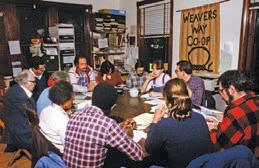
Valentine’s Day Rice Krispy Treat Decoration
Saturday, February 11
2:30-3:30 p.m.
Ilene Ogando Cohen
Trained Chef and longtime Co-op member
Ilene Ogando Cohen will share tips and tools for decorating yummy Rice Krispies treats in this fun workshop. This workshop is for all ages and participants will go home with the rice crispy treats they decorated. This is an in-person workshop at our Germantown Outreach office, located at 326B W. Chelten Ave.
Adults and kids are requested to register to attend the workshop.
Vegetable Garden Planning Workshop with Backyard Eats
Saturday, February 18
1- 3 p.m.
Backyard Eats Staff
An interactive, free workshop. Attendees will be led by Backyard Eats, a local, full service food gardening company. They will cover best practices for garden setup and infrastructure, followed by a comprehensive garden plan for spring, summer and fall gardens. Attendees can access their own copy of the 2023 Backyard Eats
order form, which contains custom vegetable options suited for our climate and draws on methods of planning and planting. With their garden square-footage information, attendees will be able to walk through the planning process on a tablet or laptop in real time and finish the workshop with a garden planting guide that their list of plant selections and information regarding plant sun requirements, spacing, support, etc. This workshop will be hosted at the Wissahickon Valley Public Library, Ambler Branch. Located at 209 Race St, Ambler PA 19002
Connect and Create into Healing
Saturday, February 25
3-4:30 pm
Shara Harad Oaks
Shara will provide an opportunity for young people (ages 14-17) to experience validation, empowerment and connectedness while cultivating joy through movement, creativity, and discussion. This will be a good fit for any young person who has artistic inclinations and is interested in exploring mental well-being. Young people of ALL identities are welcome. Based on participants' interest, we may do a combination of the following: creative movement, breathing exercises, guided discussion and a collective craft (materials provided). Registrants will leave
with coping strategies for stress management, a sense of belonging in community, and being part of the shared struggle and resilience we have all experienced in the pandemic. This workshop will take place at our Germantown outreach office located at 326B W. Chelten Ave.
Membership Office and Notary Hours

Mt Airy: 555 Carpenter Lane
Membership and Notary Services


Monday - Friday
11 a.m. - 5 p.m.
Germantown: 326B W. Chelten Ave.

Membership Hours
Tuesday - Thursday
10 a.m. - 4 p.m.
Germantown Outreach and Notary Services
Tuesday - Thursday
11 a.m. - 4 p.m.
New Member Orientation
Monday, February 20 6:30-8 p.m.
January-February 2023 THE SHUTTLE 13 Got Vintage Co-op Photos? POST ‘EM ON SOCIAL MEDIA! Use hashtag #WeaversWay50 WE
HIRING Career Opportunities Ambler • Meat clerk • Deli supervisor • Dishwasher • Cook Chestnut Hill • Sandwich clerk • Front End Manager Mt. Airy • Floor Clerk • Sandwich Clerk • Grocery Clerk • Grocery Manager • Deli Manager Looking for a career change or extra hours? Scan the QR Code to apply! www.weaversway.coop/employment For more info: www.weaversway.coop/events
ARE
POWER Play Workshop Offers Participants The Chance at More Everyday Joy
by Amy Finch, Weavers Way Across the Way Wellness Buyer
Exhibit Focuses on Efforts to Find Joy Amid COVID Sadness




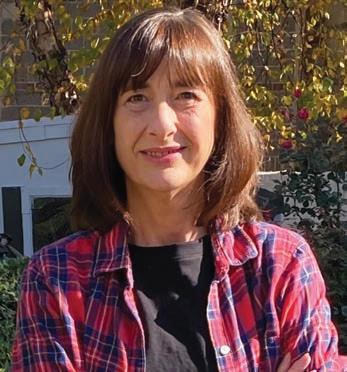
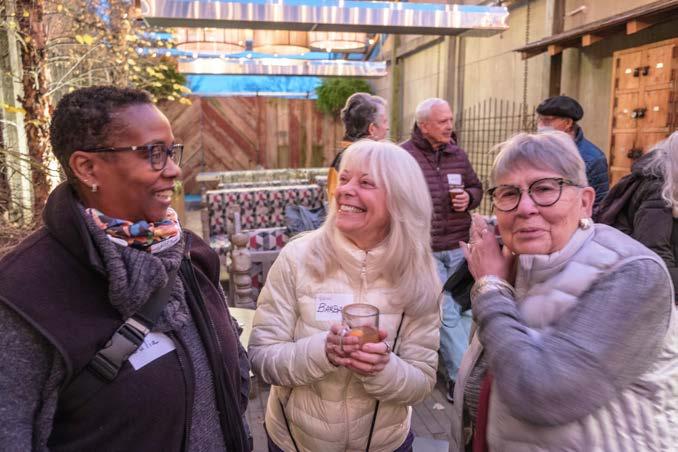

The Current exhibition at the PL130 Gallery at PhotoLounge near Rittenhouse Square, highlights through photography the different beliefs, ideas and perspectives people have about euphoria.
“Me and My Euphorie,” on view through Feb. 25, is curated by Innocencia Sackey and aims to show audiences across race, age, disability and gender that happiness can come from anywhere. The images come from Sackey’s experience in Black and queer communities and emphasizes that it is possible to find joy amid the darkest moments in our lives.
The PL130 Gallery at PhotoLounge opened in 2021 with a mission
to raise the voices of a diverse photo community and to show important new work by emerging photographers. For the sake of equity, the gallery eschewed any costs associated with entering or exhibiting shows. Rather, costs are sponsored entirely by an active film photography club in which members pay $8 in monthly dues to support local art. All work is printed by PhotoLounge on museum-quality substrates and hung unframed.
An open house reception for “Me and My Euphorie” is scheduled for Friday, Feb. 3 from 6-9 p.m. PhotoLounge is located at 130 S. 17th St. and is open noon-5 p.m. every day except Sunday.

Weavers way is sponsoring a POWER Play workshop, open to all Co-op members and staff, on Thursday, Feb. 16 from 6-8:30 p.m. at Mt Airy Axis, 520 Carpenter Lane. POWER Play is designed to help participants find more personal freedom and increase joy in their everyday lives.
My dear friend and colleague James Johnson and I were inspired to create the workshop after meeting for breakfast at the Center City location of Green Eggs Café. The name of the restaurant inspired a conversation about why people resist trying new things even when it might be something they end up loving. James and I, both seasoned clinical social workers, let the conversation evolve toward the question, “What new skill, if ventured to learn, would have the greatest possibility for positive impact on someone’s life?” Many ideas flowed, but we quickly centered on a few, with helping people to see the beauty of their true nature topping the list.
How do you get people to move closer to the concept and practice of selflove? James and I fully believe in Rumi’s words, “We are all just walking each other home.” As therapists, we believe that we all have the answers inside us. But having someone walk alongside provides
the gentle nudge we all need at one time or another.
The workshop is the result of 12 months of research, discussion, data collection and dreaming. POWER stands for Positive Outcomes Where Everyone Rises. Play is an essential part of life and the most basic way in which we learn. The workshop uses video, music, improv games and shared knowledge that address the question, “How can we have more freedom and happiness in our lives?”
Within a liberated and trauma-informed space, this workshop offers participants key takeaway skills. If practiced, these skills can have a lasting positive effect on the quality of our lives. We discuss and offer pathways into meditation, the power of play and stress management, while extending an invitation inward to our truest selves. James and I ask you to, in the words of Chris Assaad, “Close your eyes and imagine the best version of you possible. That’s who you really are. Now, let go of any part of you that doesn’t believe it.”
To register, email: powerplayworkshop@gmail.com. Please include your full name and phone number in the email so that we can confirm your registration. Workshop size is limited to 20 participants.

14 THE SHUTTLE January-February 2023 Emotional and Psychological Support and Wellness Certified Alcohol and Drug Counselor and Clinical Psychologist JEREMY FRANK & Associates Zoom and Teletherapy available Phone: 215-356-8061 Email: jfrankphd@gmail.com www.JeremyFrankAssociates.com Arts & Culture Social Justice Engagement Social Gatherings Film Discussions Community Connections CONNECT NorthwestVillageNetwork.org 267-571-9697 Ride Share Join us at our next Member Social! ENGAGETHRIVE
Seniors
Amy Finch
James Johnson
Go Light on the Road Salt to Protect Water and Wildlife
by Erin Landis, Water Programs Manager, Wissahickon Trails
Despite unseasonably mild weather this year, there is no escaping wintry precipitation and subsequent salting. Millions of people across the Northeast use salts to de-ice their driveways and sidewalks. De-icing is critical to public safety, but these salts impact the health of waterways. As ice and snow melts, salt levels in streams increase due to runoff from parking lots, roads and homes. Widespread and long-term salt use in the winter leads to elevated salt levels in streams year round.
Freshwater systems have naturallyoccurring low levels of dissolved salt that originate from rock and natural materials. Elevated salt levels from widespread use of road salts can be toxic to wildlife that live in or around streams. And high salt concentrations impact the stream ecosystem, and wildlife make water more corrosive to infrastructure, which can cause damage to bridges and pipes. The Flint, MI water crisis was partially the result of high salt levels in water due in part to road salting. The salt deteriorated lead pipes to such a degree that the water was unsafe to drink.
Elevated salt levels can also impact people with health conditions such as heart and kidney disease. Once salt is present in water, it is difficult and costly to remove, and salt levels in drinking water can increase from the widespread use of road salts.
For those looking for better de-icing products, unfortunately there is no labeling regulation for products that are marketed as “environmental” or “eco-friendly.” In fact, any product containing chloride (salt) will be harmful to streams, and even de-icing alternatives that don’t contain chloride are usually harmful to streams in other ways.
Here are some steps you can take to reduce the negative impact of road salts, while still staying safe during ice and snow:


● If you have the flexibility, work from home and plan to stay in during wintry weather.

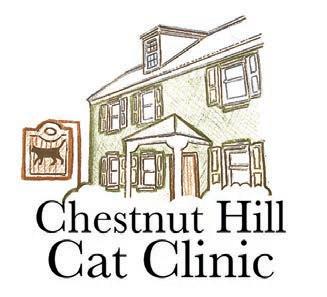
● Shovel early and often during winter storms to minimize the need for de-icers.
● Apply de-icers sparingly and according to manufacturer’s instructions. Applying extra de-icers does not melt more ice or melt it faster, and most people use more de-icing product than necessary.
● If you use a de-icing product, sweep up extra material left on the ground after the snow melts – you can use it again during the next storm and limit the amount of salt or alternative product that gets washed into nearby streams.

● Shovel a neighbor’s sidewalk or driveway who may be older or unable to shovel themselves.
● Monitor salt in streams with Wissahickon Trails and the Izaak Walton League of America. Visit iwla. org to order a free sampling kit or contact erin@wissahickontrails.org to learn more.

 llustration by Alli Katz
llustration by Alli Katz

January-February 2023 THE SHUTTLE 15 215-247-9560 8220 Germantown Avenue www.chestnuthillcatclinic.com Taking care of cats and their people for over 35 years. Locally Grown
This February, There’s a Lot to Love in the Wissahickon
by Ruffian Tittmann, Executive Director, Friends of the Wissahickon







With february being the unoffiCial month of love, what better time to explore all there is to love about winter in the Wissahickon? Here are a few suggestions:

Take in Great Views
With little or no foliage on the park’s primarily deciduous trees, the views of the valley landscape are unobstructed and it’s a lot easier to see the shape of the gorge and other features that are usually concealed by leaves and green. To plot out a hike to take in the views along the top of the Valley on the White Trail, download Friends of the Wissahickon’s Map App. It’s a free, interactive map of the park with information about trails, parking, amenities and points of interest. It also includes audio tours with FOW Trail Ambassadors on the Wissahickon’s history, geology and nature that you can take along with you — in the park or anytime. The app is available on IOS or Android or you can use a web version on your mobile phone.
Look Out for Birds
If you’ve ever wanted to get into birding, now is the perfect time, since birds are a lot more visible on trees without leaves. While there are fewer birds in our region during winter, in the Wissahickon, many species stick around. From Feb.17-20, you can participate in the Great Backyard Bird Count (birdcount.org/participate/). The bird count is a free, fun and easy event that engages bird watchers of all ages and skill levels to identify and count birds and submit them. The count gives scientists a real-time snapshot of bird populations to help them better understand and protect birds worldwide. As the event’s website says, this event is “when the world comes together for the love of birds.”
Become a Habitat Monitor


What’s living in Wissahickon Valley Park this winter? In 2020, FOW partnered with scientists from Drexel University’s Academy of Natural Sciences to find out. Since then, we’ve enlisted volunteer scientists like you to track habitat changes across the park and fill in data gaps, which will inform the priority and type of habitat resto-
ration projects FOW does in the future. It’s easy to do — just take your smartphone along with you on a hike and document flora and fauna you see along the way.

We are looking for changes by season; the winter 2022-2023 Habitat Monitoring Zone is Valley Green. Download the eBird and iNaturalist apps and check out fow.org/volunteering/habitat to get started on citizen science in the Wissahickon.
Try a New Trail
There’s actually a Lover’s Leap in the Wissahickon. At the south end of the park, take the Yellow Trail above the ridge line to Lover’s Leap, a wonderful lookout (especially in winter) way above the creek where Philadelphia author George Lippard was married to Rose Newman in 1847. (The trail down to the Bluestone Bridge is steep and rocky, so watch your footing, especially in the snow or ice). Here’s a guided hike blog that will take you there from anywhere: fow. org/a-hike-you-can-get-to-from-anywhere/.
Go with the Snow
When it snows in Philadelphia, the park offers several easy trails for cross country skiing, including Forbidden Drive, Andorra or Houston meadows. Or try snowshoeing on some of the upper trails.
Read Love Letters to the Red Covered Bridge

As the only remaining covered bridge in the Wissahickon, the Thomas Mill or Red Covered Bridge is an iconic spot in the park. Generations of visitors have stopped to admire this beautiful structure or made special memories there and have been inspired to write love letters to it. FOW publishes many of these special notes on our Reflections Page at fow.org/virtual-valley/ reflections/.
Be a Friend

There are lots of ways to show your love for the wonderful Wissahickon. You can volunteer at one of our many workdays or help keep the park clean on your own through our Wissahero program. Or support all our work in the park by becoming a member, or renewing your
membership by visiting fow.org/membership-donations/. This month and all year long, discover the beauty and history that lives in the Wissahickon. As the poet E.B. White said, “Always be on the lookout for the presence of wonder.”
16 THE SHUTTLE January-February 2023
LOVE PEACE SANDWICH 1 2 3 4 5 6 7 8 9 10 FREE Buy 10 Weavers Way deli sandwiches and get the 11th free! Pick up a Weavers Way sandwich loyalty card from the cashier. Buy 10 and the 11th is on the Co-op! See card for details. Grant Fox Contracting 215-771-2713 Custom Renovations • Fine Cabinetry Old House Renovations and Repairs Kitchens • Baths • Additions Over 25 Years of Experience Co-op Member
Interior/Exterior Painting 35 Years of Professional Experience Locally owned and operated Schedule your free estimate Visit us online: planetpaintsolutions.com 215.948.3747 Lead Paint Certified Contractor. Hansell Contractors, Inc. Builders - Historical Restoration - Fine Carpentry Energy Conservation - Architectural Design Services HansellContractors.com Office: 215-277-1540 Fax: 215-277-1390 Lic.# PA022176 EPA Lead Certified equalexchange.coop Fair Trade & Equal Exchange Packaged Coffees • Crafted with care • Sourced directly from smallscale farmers MEMBER BENEFIT notary service BY APPOINTMENT Mt. Airy: 215-843-2350 x119 or notary@weaversway.coop Germantown: cpoinvil@weaversway.coop ANOTHER GREAT REASON TO JOIN.
Grant@GrantFox.biz
Melvin A. Chappell captured this scene of a snowy Rittenhouse Town to win the Winter category of FOW’s biennial photo contest last year.
The U.S. Needs to Do More to Protect Us from Toxic Chemicals
by Sandra Folzer, Weavers Way Environment Committee
Imistakenly assume that the air i breathe and the water I drink is safe, that the Environmental Protection Agency is watching out for me and my family. I wish it were true, but our country is doing a poor job of protecting us; in fact, they are doing almost nothing.
For example, last June, the EPA found that HBCD, a chemical used in building material and flame retardants, “presents an unreasonable risk of injury to human health and the environment.” That’s good, but they haven’t banned it yet, as 180 other countries have done.
The EPA is supposed to use the best available science to regulate pesticides to make sure they are safe. Rachel Carson’s 1962 book, “Silent Spring,” exposed the long-term costs of unregulated pesticides. As a result, the endangered American eagle was saved by the regulation of DDT, an early synthetic insecticide. However, as companies began pressuring for deregulation, and former EPA employees began working for the pesticide industry, the EPA has been unable to say “no” to harmful pesticides, despite compelling research.
In 2019, the United States used 322 million pounds of over 70 agricultural pesticides that were previously banned in the European Union, according to a June 2019 article in Environmental Health Journal. Now the EU is cutting its use of pesticides in half by 2030. And while our use of pesticides has decreased by more than 40% since 1992, the chemicals we use are more potent and do more damage to more species, including pollinators and aquatic invertebrates, according to an April 2021 article in The Scientist.
Because the effects of pesticides cannot be seen immediately, it is easy to overlook their danger. But basically, we are poisoning our land. Pesticides have been implicated in the increasing rates of lung cancer, Parkinson’s disease and asthma.
The United States also continues to use millions of pounds of pesticides which have been banned or are being phased out in Brazil, China and India. In addition, we use over 100 million pounds of hazardous pesticides like 2,4-D (in Roundup) and atrazine, which are known to cause cancer and birth defects. While the EU, Brazil and China, the other leading agricultural producers in the world, have begun to restrict more and more pesticides, the United States has not, according to the to the EHJ article mentioned earlier.
Roadblocks to Banning Pesticides Here
While the EPA is good at assessing pesticides and sometimes requires labels that restrict their use, it usually does not
ban them outright. That may be because the pesticide industry only has to demonstrate that its products “will not generally cause unreasonable adverse effects on the environment.” In contrast, the European Commission, which oversees pesticide approval in the EU, seeks to “ensure that industry demonstrates that substances or products produced or placed on the market do not have any harmful effect on human or animal health or any unacceptable effects on the environment.”
The Supreme Court doesn’t help, either. Last July they restricted the EPA’s ability to regulate greenhouse gases in West Virginia vs. EPA. This sets a precedent to limit government agencies from establishing new regulations.
In 1976, Congress passed the Toxic Substances Control Act, but it was not effective, because the EPA could not ban toxic industrial chemicals. The 2016 Frank Lautenberg Chemical Safety for the 21st Century Act was intended to improve the law, but left details up to current administrations.
The United States did not ratify the Stockholm Convention treaty in 2015, which banned pentachlorophenol, a chemical used on utility poles which is a potential carcinogen, as 184 other countries did. Instead, it will phase out “penta” by 2027.
If you think regulating pesticides would hurt our economy, evidence shows otherwise.
When we continue to use pesticides other countries have banned, it affects our trade negatively, because those products can’t be sold abroad. Thailand, for example, banned paraquat or chlorpyrifos residues on food in 2020. (A teaspoon of paraquat can kill an adult.) It is estimated we’ll lose at least $1 billion per year and about 7,550 related jobs by not changing our policy and being able to sell our agricultural goods to Thailand, according to an article published last September by the Brookings Institution.
Likewise, from 2016 to 2020, France prohibited the importation of cherries grown in this country because the pesticide dimethoate was still being used on our cherry trees. The loss of this export cost our economy around $5 million. And because the European Union also doesn’t allow detectable traces of dimethoate on imported cherries, it’s unlikely ours will be exported to Europe anytime soon.
How Trump Took the Teeth Out of the EPA
The EPA became industry-friendly under Donald Trump. Scott Pruitt, a climate change denier who Trump appointed to head the agency, rolled back 24 regula-
tions, according to a tracker run by Harvard University’s Environmental and Energy Law program and published last year.
An October 2020 article published in The Guardian listed 75 ways in which Trump made the planet dirtier and warmer. They included:
● Making it easier to lease public land for oil and gas drilling
● Rejecting the science calling for tougher air pollution rules
● Withdrawing from the 2015 Paris climate agreement
● Weakening the Clean Water Act, giving the federal government more power to overrule state objections to projects
● Abandoning efforts to reduce emissions from large sewage treatment plants
While Trump and Scott Pruitt, his EPA chief for most of his tenure, rolled back a lot of environmental regulations, the agency has a long history of dragging its feet when it comes to banning or limiting pollutants. The EPA first heard about the dangers of PFAS (per-and polyfluoroalkyl substances) in1998, but has yet to ban them, even though there are many studies showing links to cancer, immune system harm and other serious health problems. Over 20 years, studies and action plans were released, with no resolution.
Another example of how impotent the EPA is occurred in 2011, when agency scientists found some PFAS-like chemicals to “be toxic to people, wild mammals, and birds.” They recommended more testing, but those tests were not mandated and there is no indication they were done.
According to the Pesticide Action Network, climate change speeds up pesticide degradation, so more needs to be applied. Pesticides cause CO2 emissions from production (99% of them are made from fossil fuels) to shipment to breakdown. They also may cause ground level ozone to form. Weeds have a more diverse gene pool and are more resistant to climate change, so more pesticides will be used to control them.
Actions You Can Take
1. Inform others of the serious dangers of most pesticides.
2. Contact EPA administrator Michael Regan (202-564-4700) or at regan.Michael@epa.gov. Tell him the EPA needs to be more decisive and worry less about industry backlash. In the long term, agriculture will benefit from using fewer pesticides.
3. Tell your legislators you want the United States to align with the Stockholm and Rotterdam treaties, which provide
protection from 43 different pesticides. Since our country plans to ban them eventually, signing these treaties would speed up the process. We’ve signed the treaties but need Congress to implement change, including passing the Protect America’s Children from Toxic Pesticides Act, which was introduced in 2021. The act would immediately ban organophosphate and paraquat —which most of the world already bans —and would initiate other changes.
Meanwhile, our Pennsylvania congresspeople need to be reminded that all residents have the constitutional right to clean air and water. In 2020, the 43rd Statewide Grand Jury reported on numerous failures to protect this right, especially for those living near oil and gas drilling sites. Our representatives need to make sure the jury’s recommendations are followed in order to reduce harmful impacts.
Lastly, we must find a way to overcome the many obstacles industry places in our path in order to protect future generations. The United States does not maintain minimum standards to protect the public, while most of the rest of the world is ahead of us in setting safety standards.
The health of our soil, our water, our air and our children is being set against powerful, profit-driven industries. Our future is in the balance.
Getting Too Many Catalogs?
There’s a Way to Stem the Tide by Marsha Low, Weavers Way Environment Committee
Were you inundated with catalogs this holiday season? If so, you’re not alone.
You would think with most companies now selling their products online, businesses would scale back on sending out catalogs, but while catalog volume did decline temporarily, in recent years, it’s been on the rebound. You may find that when you order from a retailer online, they often include a catalog with your purchase or start sending them. About 11 billion catalogs are mailed in the United States each year. Of that number, 5.6 million tons of catalogs and other direct mail advertisements end up in U.S. landfills annually.
If you’d like to cut back or eliminate catalogs from your life, there’s a great online service that can help you accomplish that: catalogchoice. org. When you use this service, you search for the sender of the catalog and then opt out. The service will then inform the sender that you no longer wish to receive their catalog. You’ll find that the number of catalogs will trickle down to one or two, or even down to zero. So get busy! By next holiday season, you’ll find far fewer, if any, catalogs jamming up your mailbox.
Environment Committee Seeks Grant Applications
Once again, the Environment Committee of Weavers Way is offering small grants to community groups. This year we are giving preference to those grant applications which attempt to counteract climate change, such as planting trees and replacing lawn or turf with native plants, which benefit pollinators and birds.
Local community groups are invited to apply. Preference for awards will be given to those groups located close to Co-op stores and in underserved neighborhoods.
Funds are awarded each year for clearly identifiable public purposes which result in a tangible environmental improvement for the community through education
and/or gardening projects. Funds may be used for such projects as planting native trees and herbaceous plants, garden equipment and the enhancement of parks. Some environmentally based educational programs, especially those focused on climate change, may be funded through this program.
Grant amounts range from $100 to $500, depending upon the available funds and the number of qualified applicants. The Environment Committee hosts electronic recycling events to raise funds for these grants. Since electronic recycling is our main source of income, the Committee is grateful to those in the community who have contributed to these events.
Applications may be downloaded and printed from the Co-op’s website, www.weaversway.coop (scroll down the home page for the link). Completed applications may be dropped off in the Environment Committee mailbox on the second floor of the Mt. Airy store or sent to Environment Committee, Weavers Way Co-op, 559 Carpenter Lane, Philadelphia, PA 19119.
Applications must be received by Friday, March 3, 2023. Applicants will be informed within a month of the deadline if they have been selected. Grantees are then obliged to submit a report with receipts describing how the money was spent by Nov. 1, 2023.
January-February 2023 THE SHUTTLE 17
(Continued from previous page)
seems to apply to many of the current plant-based meat products of today.
suggestions and responses:
s: “I’ve heard we’ve had problems with our refrigeration systems lately. What is the role of refrigeration in socalled “natural food” stores? Does it belong?”
r: (Norman) Modern refrigeration systems are basically a way for us to cheat nature. Where our ancestors used root cellars and processes such as smoking, drying, pickling and fermenting to preserve food, we use electricity, chemistry and physics to create complex refrigeration systems. Unlike a home refrigerator, which often runs for 15 years without a hiccup, grocery store systems are complex. They frequently need service and are prone to all kinds of problems at inopportune times. Recently, we spent $20,000 to repair a refrigerant leak. On the bright side, this is part of how Weavers Way fulfills one of its Ends — contributing to the local economy.
s: “I frequently forget or don't realize that some item I purchase infrequently is available in the bulk section. I usually figure this out after I buy the packaged version. I'd love it if there was a list of all bulk items to reference online or in the store, even if it came with
Ned Case
To me, he was Batman. Whenever I got in trouble, whenever I faced a dilemma I hadn’t previously faced, whenever the Co-op’s fiscal ship was caught in a storm, I could always pick up the Ned phone. And he’d appear, Deus ex machina, ready to get to work.
He approached problems calmly and methodically, first by asking questions, then by testing theories and challenging assumptions, until a proper diagnosis could be made. Only after that could an effective solution be prescribed.
He was, as they say, a “numbers guy,” and that’s true: no one felt more comfortable working with numbers. But Ned was only interested in numbers to the extent that they told a story. So a Ned Case spreadsheet never, ever was presented without a narrative. It was the story behind all the charts and graphs that really mattered.
He was also usually the smartest person in the room. Because of that, not despite it, he was usually the one who asked the most questions, and he was always prepared to have his mind changed by a compelling argument. He was happy when the numbers proved his theories correct, but downright gleeful when the numbers proved his theories wrong.
His resume put most to shame. He had a bachelor’s in international studies and a master’s in European history from Georgetown. He earned an MBA from the
the disclaimer that not everything on the list is in necessarily in stock. It'd help me plan out what to go for and remember to try to make the bulk section the first place to check.”
r: (Norman) Good idea. People have occasionally asked for something like this, and it seems doable, so we’ll see what we can figure out. Thanks for the suggestion.
(Continued from Page 1)
Darden School of Business at the University of Virginia, then filled a myriad of high-level finance roles for the likes of General Motors, Campbell Soup and Armstrong Flooring. He did vital volunteer work for organizations as diverse as Commonwealth Youth Choirs, the American Philatelic Society and of course, Weavers Way.
He spoke at least four languages — English, German, French and Dutch, if I remember right, and maybe some Polish or Russian, too. He was stealthful at chess and a talented piano player. Whenever I told him I found a subject difficult, he’d say “You think this is hard? Try playing Mozart.”
So thank you, Ned, for everything you did on behalf of Weavers Way, and for everything you taught me over the years. I listened carefully, I took good notes, and I applied what I learned.
What I write here is an insufficient summary of Ned’s impact on the Co-op. His obituary should be entrusted to a more gifted writer, and to someone who knew him more closely, and for longer than I did.
Ned is survived by his wife Mary Ann and their four children, Peter, Stuart, Emma and Thomas. A memorial service is scheduled for Saturday, Feb. 11 at 2 p.m. at the Church of St. Martin-in-the-Fields, 8000 St. Martin's Lane in Chestnut Hill.
s: “Can we get fox meat? I hear it tastes like chicken, but with less fat.”
r: (Norman) Yes; it’s expensive but many people think it’s worth it. We have instructed some of our meat department staff to set traps in the Wissahickon so we’ll have a local, free-range, wild-fed source of fox meat. We’ll also sell fox fur hats at the Mercantile, along with fox leather tote bags and fox bone wind chimes. We haven’t found a use for the organs yet, so any suggestions are welcome.
s: “Will the new Germantown store have bubble tea?”
r: (Norman) Since bubble tea is “on-trend”, and part of our mission is to be “on-trend” with food fads, we will have bubble tea. We can see shoppers sitting at sidewalk tables on Chelten Avenue, happily eating sushi (but only using chopsticks — forks will be prohibited) and sipping bubble tea while discussing the latest fashion news and Tik Tok videos with their friends. We can’t help but think this scenario is what the founders of the co-op movement had in mind back in 1844 when some weavers in Rochdale, England formed the precursor of today’s food co-ops. One challenge with bubble tea is selling it bulk, since the bubbles tend to clog the dispensers. But where there’s a will, there’s a way and we have the Drexel Food Lab in our city, so we can ask them for help.
Member Loan Campaign
(Continued from Page 1)
from the city. As of now, we expect construction to begin sometime in early spring.
We have placed orders and some down payments on the store's equipment, which will arrive on site as construction continues throughout the spring and summer. It remains our goal to open the doors to Weavers Way Germantown in the fall.
We’re continuing to work toward purchasing the building; further updates will be provided when available. In addition, our outreach work, led by Germantown Outreach Coordinator Camille Poinvil, continues to ramp up. We continue to rent the space next to our future store at 326B W. Chelten Ave. for community programming.
There's much to do, and our efforts are greatly aided by the incredible support of our members. We are truly grateful, and we look forward to the exciting work ahead.
Stuart Katz is a longtime member of Weavers Way and a former at-large board director and president of the Co-op’s Board of Directors.
WEAVERS WAY ENDS
Weavers Way Cooperative Association exists to provide commercial and community services for the greater good of its members and community, to champion the cooperative model and to strengthen the local economy.
AS A RESULT OF ALL WE DO:
END 1 There will be a thriving and sustainable local economy providing meaningful jobs, goods and services to our members and the community.
END 2 Our community will have access to high quality, reasonably priced food, with an emphasis on local, minimally processed and ethically produced goods.
END 3 There will be active collaborative relationships with a wide variety of organizations in the community to achieve common goals.
END 4 Members and shoppers will be informed about cooperative principles and values; relevant environmental, food and consumer issues; and the Co-op’s long-term vision.
END 5 Members and shoppers will actively participate in the life of the Co-op and community.
END 6 The local environment will be protected and restored.
END 7 Weavers Way will have a welcoming culture that values diversity, inclusiveness, and respect.
January-February 2023 THE SHUTTLE 19
“ “
We found that it was best to drop the bars that tested highest on the Consumer Reports list.
How Donating SRECs Can Help Expand Solar Access to Homeowners
by Rishika Ghosh, for the Shuttle
Clean and reliable energy is a fundamental human right and should be attainable to anyone, regardless of income, gender, race or identity.
Beyond energy efficiency, programs that increase access to clean energy can also improve the quality of life for individuals, families and communities. For example, the decreased prevalence of asthma and acute myocarditis have been linked to access to clean and reliable energy. Other studies suggest that the presence of air conditioning in households and schools increases social mobility and productivity. Finally, structural rehabs to Philadelphia homes correlate to a 21.9% decrease in crime on the surrounding block, according to a JAMA Network article from July 2021.Clean and reliable energy is critical to the prosperity, safety and well-being of every human being.
In Philadelphia, solar energy has been widely adopted in affluent communities. However, the cost of installing solar can be prohibitive for low-income families — the ones who need it the most. According to the American Council for an Energy-Efficient Economy, low-income households can spend up to 2.4 times as much on energy bills as higher-income households. This can sig-
nificantly strain household budgets and force low-income families to make difficult choices between paying for energy and other necessities like food and medicine.
The Share the Sun program is a first-of-its-kind initiative that aims to increase solar energy access for low to moderate-income families in Philadelphia. Through the program, individuals with solar panels installed in their homes can donate the Solar Renewable Energy Credits generated by their systems to PGCC. SRECs are performance-based incentives that create economic benefits from solar generation. One SREC is allotted to each megawatt-hour of solar energy produced; an average Philadelphia home produces three to five SRECs each year.
PGCC monetizes donated SRECs through an exclusive contract with the city. The SREC revenue generated from a single SREC donor can subsidize solar on at least one new lower to middle-income home. PGCC wants to scale this program to 100 households by June of this year.

Donating SRECs via the Share the Sun program is an excellent way for homeowners and businesses with existing solar installations to make a meaningful impact
within their communities. By doing so, the revenue generated from the sale of SRECs can expand solar access in low and moderate-income communities across the city.
Deploying solar in low to moderate-income communities has lasting benefits. It can build local climate resilience, improve public health and safety, increase property values and keep families in their homes. Furthermore, it can also help to create clean energy jobs and elevate the overall well-being of our community.
Programs like Share the Sun help to make solar energy more accessible and equitable. They provide relief to families, improve their overall financial stability, and support the transition to a more sustainable, equitable and climate-resilient Philadelphia.
we our members

As part of the Co-op’s efforts to reduce our use of single-use plastic, customers can purchase certain items in reusable containers. There are a variety of containers available, with different deposits required.
2.
3.
4. Spread the word to family and friends, so they can help save the Earth, too!
20 THE SHUTTLE January-February 2023 To learn more, go to phillygreencapital.org/sharethesun Give the gift of solar by donating your Solar Renewable Energy Credits (SRECs) to subsidize the cost of solar installations in Philadelphia's low- and moderate-income communities. Ready to help families go solar? Visit phillygreencapital.org/sharethesun to get started. SHARE THE SUN Lowers energy bills Builds local climate resilience Improves public health & safety More Low-Income Families Going Solar... SRECs donated by 1 family can help 1 low-income family go solar The cost of installing solar can be prohibitive for low income families. Have solar? Your rooftop is generating more than electricity! Store Prep Deli Bulk Produce Grand Total Ambler 2667 157 533 950 4307 Chestnut Hill 2447 222 500 0 3169 Mt. Airy 1756 359 1448 0 3563 Totals Sold 6870 738 2481 950 11,039 Deposits Refunded 6795 Return Rate 62% Total Containers by Department (as of this month) A program run by Echo Systems with support from the Weavers Way Plastic Reduction Task Force CONTAINER REFUND PROGRAM
Deposit Cost Per Container $2 $2 $3 $4 Soups Cut Fresh Fruit (Watermelon & Pineapple) Bulk Bulk, Grab-and-Go Soups Prepared Foods Shredded Cheddar, Olives Green Beans Brussel Sprouts Baby Spinach Micro-Greens Products Packed 1 Look for labels with a CRP logo on our shelves.
Buy the item — the cost of the container is tied to the product.
Once it’s empty, wash the returnable item and take it to
the Co-op; you’ll get the cost of the container refunded.
How the Container Refund Program Works Note: DO NOT WRITE ON OR STICKER CRP containers.
O•P•I•N•I•O•N
Rishika Ghosh is a senior associate at the Philadelphia Green Capital Corp., the nonprofit green bank affiliate of the Philadelphia Energy Authority.
Artists in Our Aisles
Cheryl Ann Dever Rapp

I live in Blue Bell and work as a commissioned artist. I’ve enjoyed painting all my life, but started painting in earnest three years ago under the skillful instruction of Patrick Winston, professor of art at Montgomery County Community College. My course of study began with still life paintings, landscapes and more recently, a specialization in portraits.
Artist Statement
Although I still enjoy painting still lifes and landscapes, portraits bring me the greatest joy. A portrait is a legacy gift for your family, something that can be passed down to the next generation. It is a special project for both the artist and the client as they work together to design the painting and share the client’s unique story through art. I believe oil painting has taken on an even more significant role in the age of digital photography. Paintings do not get thrown away or lost on the “cloud.” They don’t fade and never go out of fashion. www.cheryldeverart.com


We want to feature your art in the Shuttle! Please submit the following to Richard Metz (thembones2@hotmail.com):
(Two) 4” x 6” high-resolution images (300 dpi) A short statement about the work • A short bio A head shot • A link to a website if you have one
Weavers Words
Congratulations and Hooray
To wonderful Weavers Way
Celebrating its 50th Birthday.
Weavers is an oak tree
Having long roots in our community
Strengthening and nourishing
Our bodies and our spirit.
It’s no wonder why we love and cherish it.
—Henrietta Edelschein
Our Revised Submission Guidelines:
1. Original poems must be of a reasonable length. Lengthy poems that are the subject of a reflection will be excerpted.
2. The Shuttle editor has the final say as to whether a poem or reflection is suitable for publication.
3. The number of poems or reflections in an issue is determined by the amount of space available.
4. Members and nonmembers are welcome to submit.
5. Email your submissions to editor@weaversway. coop and put “Poetry submission (or reflection) for Shuttle” in the subject line.
Editor’s Note: Our first Weavers Reflection comes from member Bill Dingfelder, whose poems have previously been published in “Weavers Words.” We will continue to accept reflections on poems as well as original works; please see our revised guidelines below.
I've always loved Allen Ginsberg's "Howl," which he wrote in 1956. It’s a passionate, detailed screed that captures the artistic, intellectual, anti-establishment feeling of the beatnik age. Yet, it transcends that time and space: It was again popular in the 1960s, and it remains popular today among many of us. To me, it's a reminder that, even at age 70, I should remain energized, active and working as long as I can toward "Tikkun Olam," the Jewish mantra and mandate to "repair the world." It's also inspiring that so many Weavers Way members feel and act the same way, whether they're Jewish — like Ginsberg and me — or not.
—Bill Dingfelder
Howl (excerpt) by Allen Ginsberg
I saw the best minds of my generation destroyed by madness, starving hysterical naked, dragging themselves through the negro streets at dawn looking for an angry fix, angelheaded hipsters burning for the ancient heavenly connection to the starry dynamo in the machinery of night, who poverty and tatters and hollow-eyed and high sat up smoking in the supernatural darkness of cold-water flats floating across the tops of cities contemplating jazz, who bared their brains to Heaven under the El and saw Mohammedan angels staggering on tenement roofs illuminated, who passed through universities with radiant cool eyes hallucinating Arkansas and Blake-light tragedy among the scholars of war, who were expelled from the academies for crazy & publishing obscene odes on the windows of the skull, who cowered in unshaven rooms in underwear, burning their money in wastebaskets and listening to the Terror through the wall…
January-February 2023 THE SHUTTLE 21







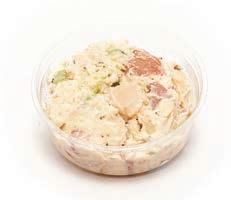
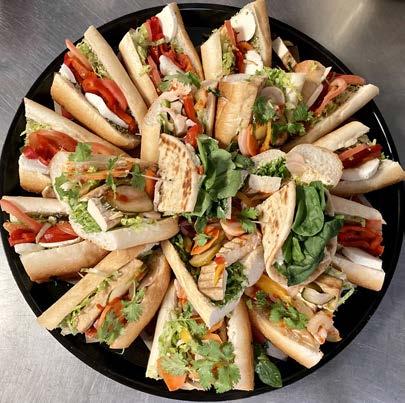



22 THE SHUTTLE January-February 2023 FIND US ONLINE www.TheResiliencyCenter.com TheResiliencyCenter ResiliencyCntr resiliencygatherings Join us for counseling and FIND US IN FLOURTOWN Flourtown Commons 1811 Bethlehem Pike Suite 212-213 (215) 233-2002 and connect The Resiliency Center is your place in G reater Philadelphia for Healing, Education, and Community. 3 DAYS ONLY February 10-12 while supplies last SUPER SNACK MENU Beef Chili $9.99/qt reg. $11.99 Vegan Bean Chili $7.99/qt reg. $9.99 Buffalo Chicken Wings $8.99/lb Ready to reheat with Buffalo and bleu on the side HOAGIE TRAYS DIPS Guacamole $12.99/lb Black Bean Corn Salsa $6.99/lb Alex’s Spicy Pimento Spread $9.99/lb Pico de Gallo $8.99/lb Potato Salad $6.79/lb Macaroni Salad $6.99/lb Mix and match. Let Weavers Way prepare a tray of your favorite hoagies! Lucia Italian Hoagie $7.99 Pepper ham, capicola ham, Genoa salami, sopressata Roast Beef $9.99 Roast Turkey $8.99 Tuna Salad $8.99 Three Cheese $6.99 Provolone, Swiss, American All hoagies come with provolone, lettuce, tomato, onion, salt, pepper, oregano, mayo or Italian vinaigrette. reg. $9.99 HUMMUS all flavors $4.49/lb reg. $6.49 Fly Eagles Fly!
Weavers Way Board
The Weavers Way Board of Directors represents members’ interests in the operation of the stores and the broader vision of the Co-op.
The Board’s regular monthly meeting is held on the first Tuesday of the month. Meetings are currently taking place online until further notice. Check the Co-op’s Calendar of Events for the date of the next meeting.
For more information about Board governance and policies, visit www.weaversway.coop/board. Board members’ email addresses are at www.weaversway.coop/board-directors, or contact the Board Administrator at boardadmin@ weaversway.coop or 215-843-2350, ext. 118.
2021-2022 Weavers Way Board
President: Esther Wyss-Flamm
Vice President: Cheryl Croxton
Treasurer: Michael Hogan
Secretary: De’Janiera B. Little
At-Large: Hillary Baum, Jason Henschen, Gail McFaddenRoberts, Frank Torrisi, Josh Bloom, Kristin Haskin-Simms and Una Kang.
The Shuttle
Editor: Karen Plourde editor@weaversway.coop, 215-843-2350, ext. 135

Art Director: Annette Aloe
annette@weaversway.coop, 215-843-2350, ext. 130
Advertising Coordinator: Karen Plourde advertising@weaversway.coop, 215-843-2350, ext. 135

Proofreaders this issue: Vivian Doskow, Hunter McCorkel, Ken Shepley, Marisa Willis Diaz
Contributors this issue: Jon Roesser, Hilary Blum, Sylvia Gentry, Stuart Katz, Kieran McCourt, JD Walsh, Shireen Qadri, Nima Koliwad, Glenn Bergman, Alisa Shargorodsky, Sue Landers, Sally Mccabe, Esther Wyss-Flamm, Betsy Teutsch, Rosa Lewis, Amy Finch, Erin Landis, Alli Katz, Ruffian Tittmann, Sandy Folzer, Marsha Low, Norman Weiss, Rishika Ghosh.
HOW TO REACH US
Admin
215-843-2350
General Manager Jon Roesser, ext. 131 jroesser@weaversway.coop
Finance Director Earl Pearson, ext. 105 epearson@weaversway.coop
Purchasing Director Norman Weiss, ext. 133 normanb@weaversway.coop
HR Director Lauren Wright, ext. 132 hr@weaversway.coop
IT Director David Chaplin-Loebell, ext. 127 IT@weaversway.coop
Membership Manager Kirsten Bernal, ext. 119 member@weaversway.coop
Retail Director Jess Beer, ext. 121 jbeer@weaversway.coop
Comm. Programs Coordinator Nima Koliwad nkoliwad@weaversway.coop
Farm Manager Nina Berryman, ext. 325 nberryman@weaversway.coop
Facilities Manager Doug Keener, ext. 128 dkeener@weaversway.coop
Admin (Ambler)
215-302-5550
Development Director Kathleen Casey, ext. 347 kcasey@weaversway.coop
Executive Chef Bonnie Shuman, ext. 374 bonnie@weaversway.coop
Ambler
217 E. Butler Ave. 8 a.m.-8 p.m. 215-302-5550
Store Manager Heather Carb, ext. 300 hcarb@weaversway.coop
Grocery
Nancy Timmons Melley, ext. 373 nmelley@weaversway.coop
Front End Manager Hillary Bond, ext. 375 hbond@weaversway.coop
Produce Mira Kilpatrick, ext. 377 mkilpatrick@weaversway.coop
Prepared Foods Alisa Consorto, ext. 374 aconsorto@weaversway.coop
Meat, Poultry and Seafood Mark Baker, ext. 361 mbaker@weaversway.coop
Floral Buyer Mira Kilpatrick, ext. 377 mkilpatrick@weaversway.coop
Bulk Ken Kolasinski, ext. 379 kkolasinski@weaversway.coop
Bakery Maija Brozovskis, ext.376 mbrozovskis@weaversway.coop
Wellness Andrea Houlihan, ext. 378 ahoulihan@weaversway.coop
Chestnut Hill 8424 Germantown Ave. 8 a.m.-8 p.m. 215-866-9150
Store Manager Dean Stefano, ext. 212 dstefano@weaversway.coop
Assistant Store Manager Valerie Baker, ext. 215 vbaker@weaversway.coop
Front End Manager Ashley Hammock, ext. 215 ahammock@weaversway.coop
Grocery James Mitchell, ext. 217 jmitchell@weaversway.coop
Produce Tierra Burton, ext. 211 tburton@weaversway.coop
Deli Ann Marie Arment, ext. 208 aarment@weaversway.coop
Prepared Foods John Adams, ext. 218 jadams@weaversway.coop
Meat, Poultry and Seafood Ron Moore, ext. 205 rmoore@weaversway.coop
Bakery Kriss Walker, ext. 217 kwalker@weaversway.coop
Bulk Danielle Mitchell, ext. 217 dmitchell@weaversway.coop
Next Door 8426 Germantown Ave. 9 a.m.-8 p.m. 215-866-9150, ext. 221/220
Wellness Manager Chris Mallam, ext. 221 cmallam@weaversway.coop
Catering: cateringMA@weaversway.coop, cateringAB@weaversway.coop, cateringCH@weaversway.coop
Preorders: MApreorder@weaversway.coop, CHpreorder@weaversway.coop, ABpreorder@weaversway.coop
Mt. Airy
559 Carpenter Lane 8 a.m.-8 p.m. 215-843-2350
Store Manager Rick Spalek, ext. 101 rick@weaversway.coop
Grocery Matt Hart, ext. 140 matt@weaversway.coop
Produce Shan Wichmann, ext. 107 swichmann@weaversway.coop
Deli Shawn O’Connell, ext. 134 soconnell@weaversway.coop
Prepared Foods John McAliley, ext. 102 jmcaliley@weaversway.coop
Meat, Poultry and Seafood Mike Lawrence, ext. 104 mlawrence@weaversway.coop
Bulk Juli Cardamone, ext. 142 jcardamone@weaversway.coop
Bakery Moises Iavarone, ext. 305 miavarone@weaversway.coop

Floral Buyer Ginger Arthur, ext. 317 floral@weaversway.coop
Across the Way 608 - 610 Carpenter Lane 8 a.m.-8 p.m. 215-843-2350, ext. 6
Wellness Manager Sarah Risinger, ext. 114 srisinger@weaversway.coop
Pet Department Manager Anton Goldschneider, ext. 276 petstore@weaversway.coop
January-February 2023 THE SHUTTLE 23 DID YOU KNOW? You can read the Shuttle online. The Shuttle www.weaversway.coop/shuttle-online Become a Member Want to play a role in shaping your grocery store? Just complete a membership form in any store or online, make an equity investment, and you’re good to go! We ask new members to attend an orientation meeting to learn about our cooperative model. You’ll receive two hours of work credit for attending. We look forward to meeting you! VIRTUAL NEW MEMBER ORIENTATIONS New Member Orientations
February 20, 6:30-8 p.m. To register visit: www.weaversway.coop/events
Monday,
ww w.weaversway.coop contact@weaversway.coop
& Who’s
Weavers
What’s What
Who at
Way
EASYPAY EasyPay house accounts are an EASY way to PAY at Weavers Way! ••••••••••••••••••••••••••••••••••••••••••••••••••••••••••••••••••••••••••••••••••••••••••••••••••••••••••••••••••••••••••••••• ••••• AND WHAT A DEAL: Get $102 when you deposit $100 (cash or check). We’d much rather pay YOU than the bank!
Sun, Feb 19 - Sat, March 4
Members get an extra 5% off!
Pick a shop at a main store, the Mercantile, Across the Way and Next Door during the 2-week period and get an extra 5% off (on top of your other member discounts)
MEMBER

 Hilary
Hilary





 by Karen Plourde, Editor, Weavers Way Shuttle
by Karen Plourde, Editor, Weavers Way Shuttle



























































 llustration by Alli Katz
llustration by Alli Katz





























